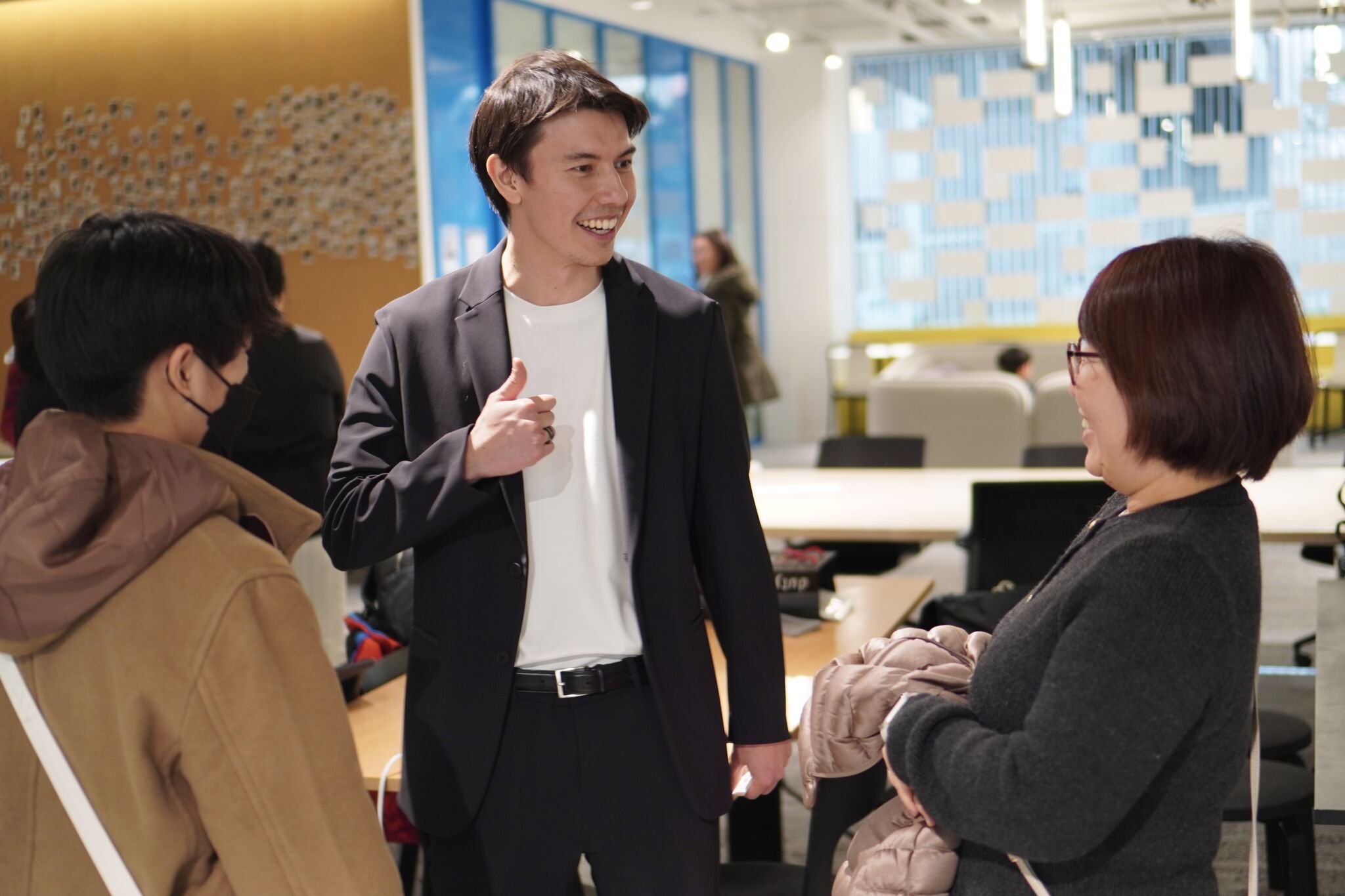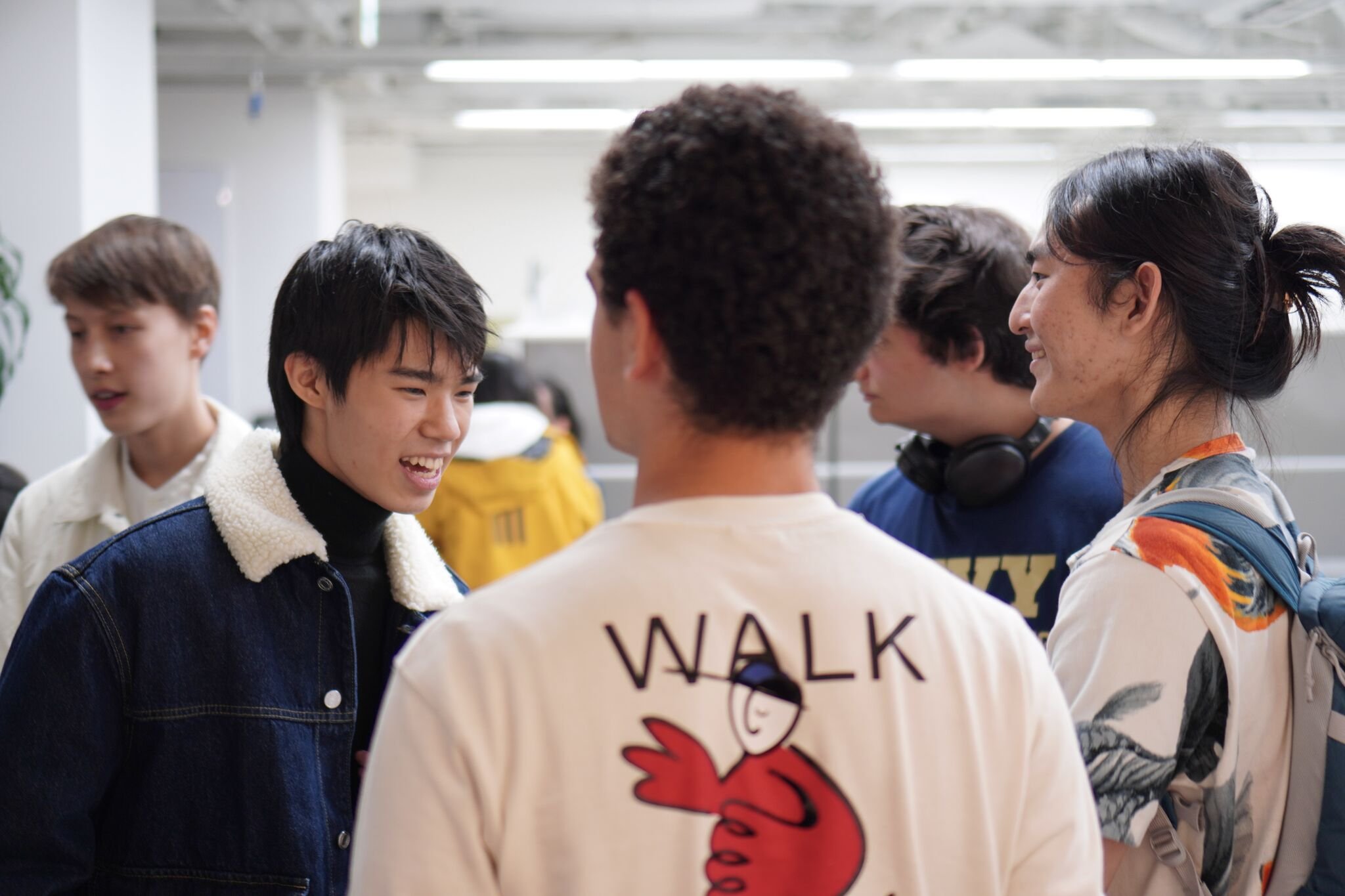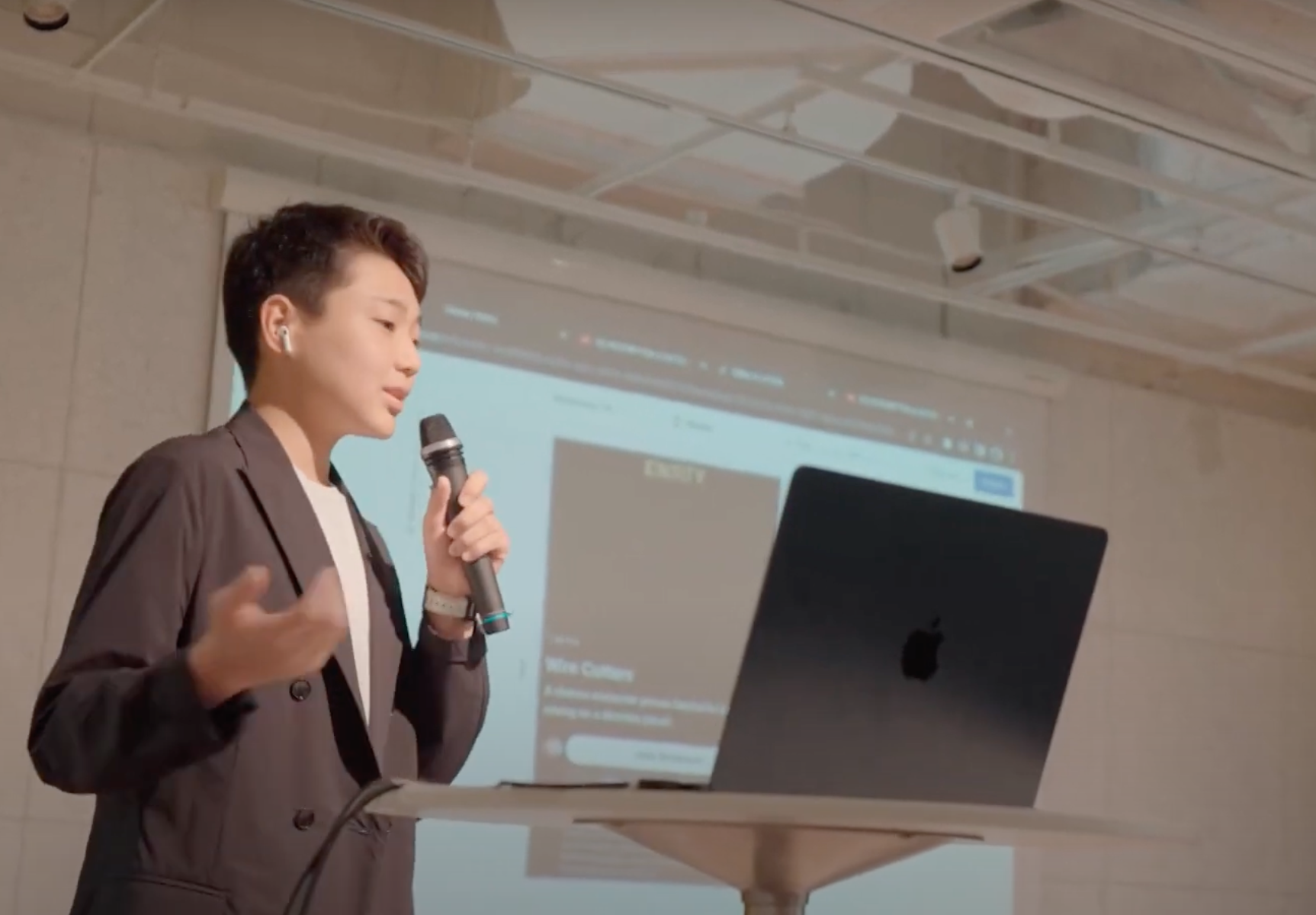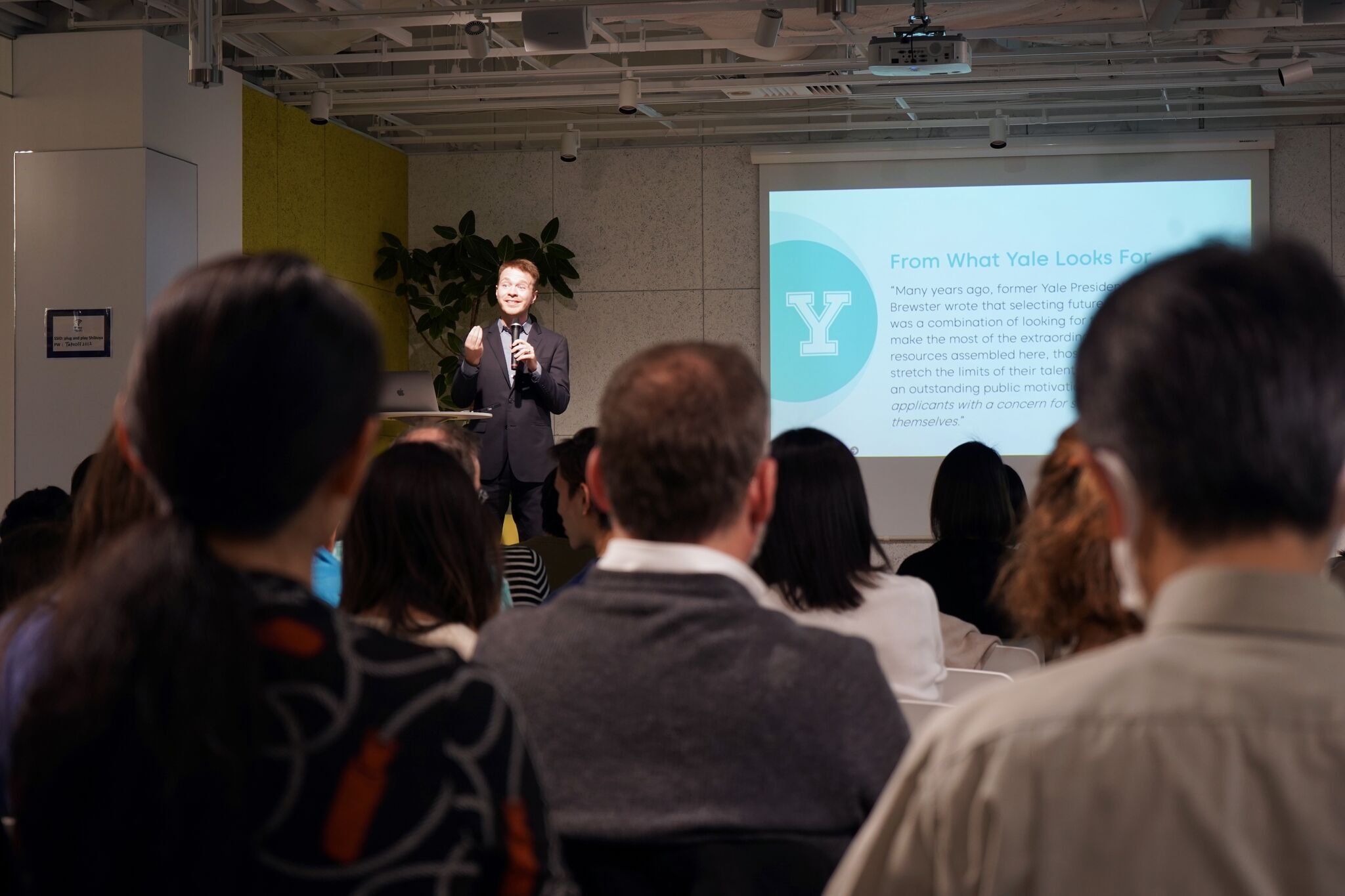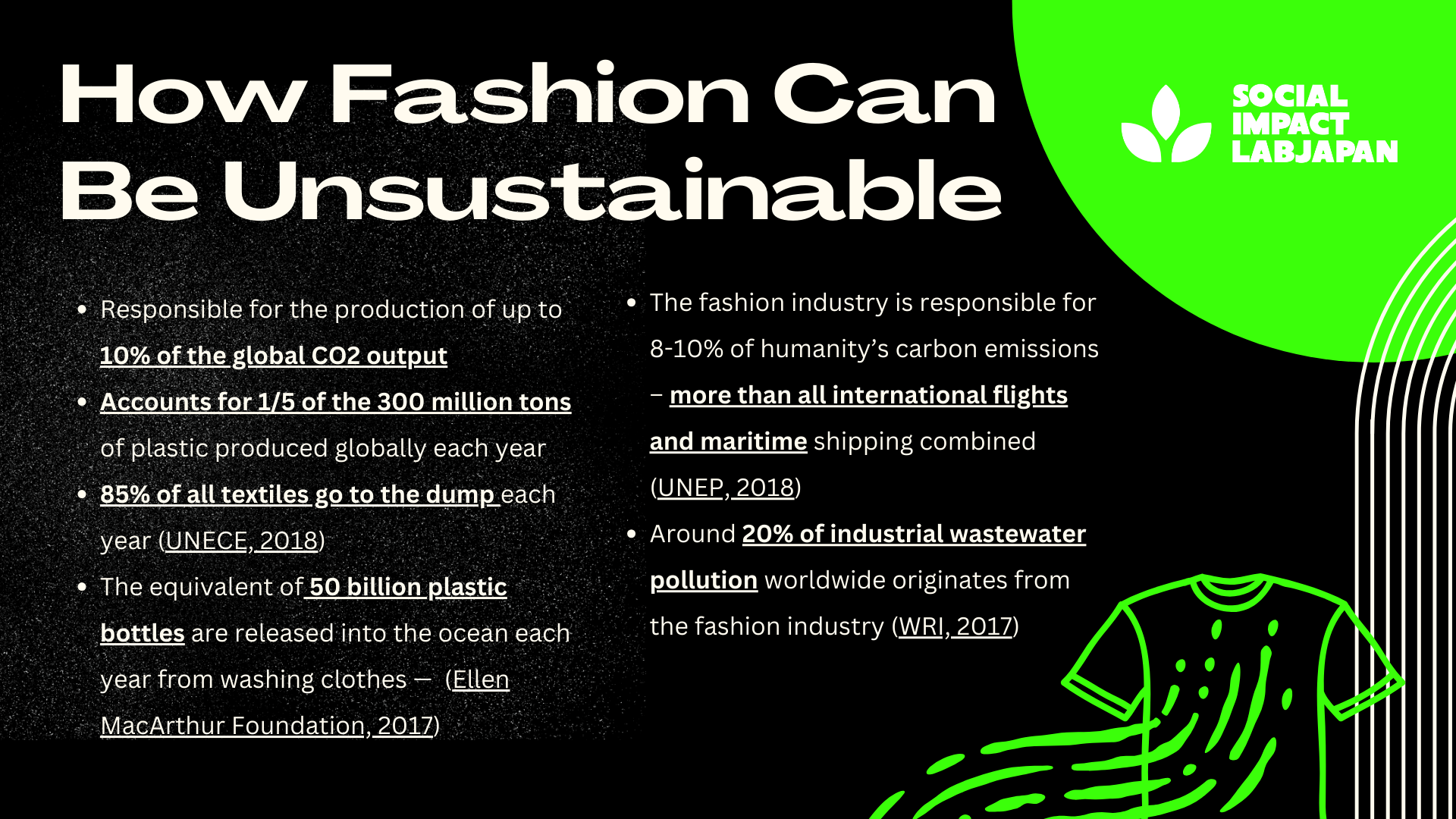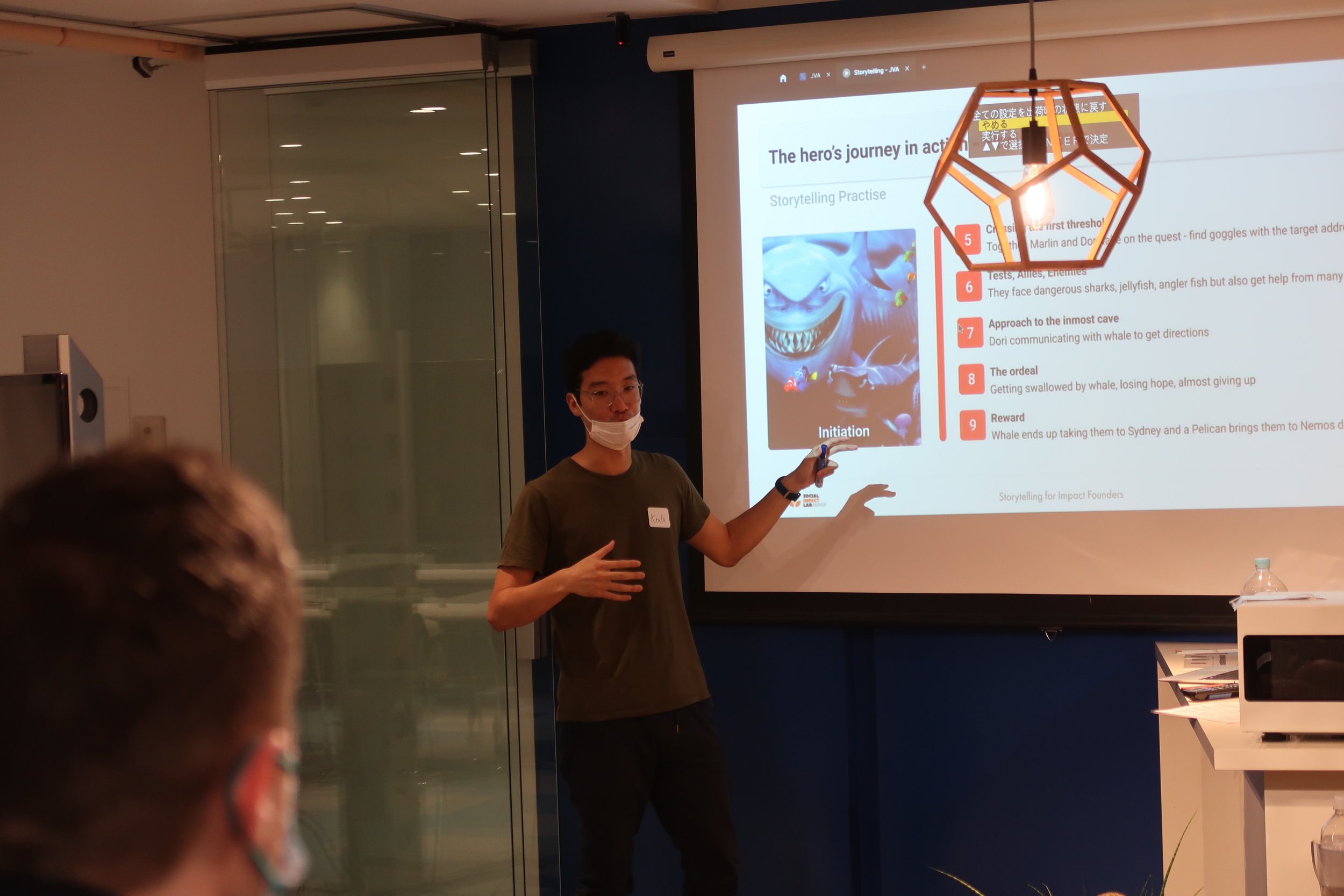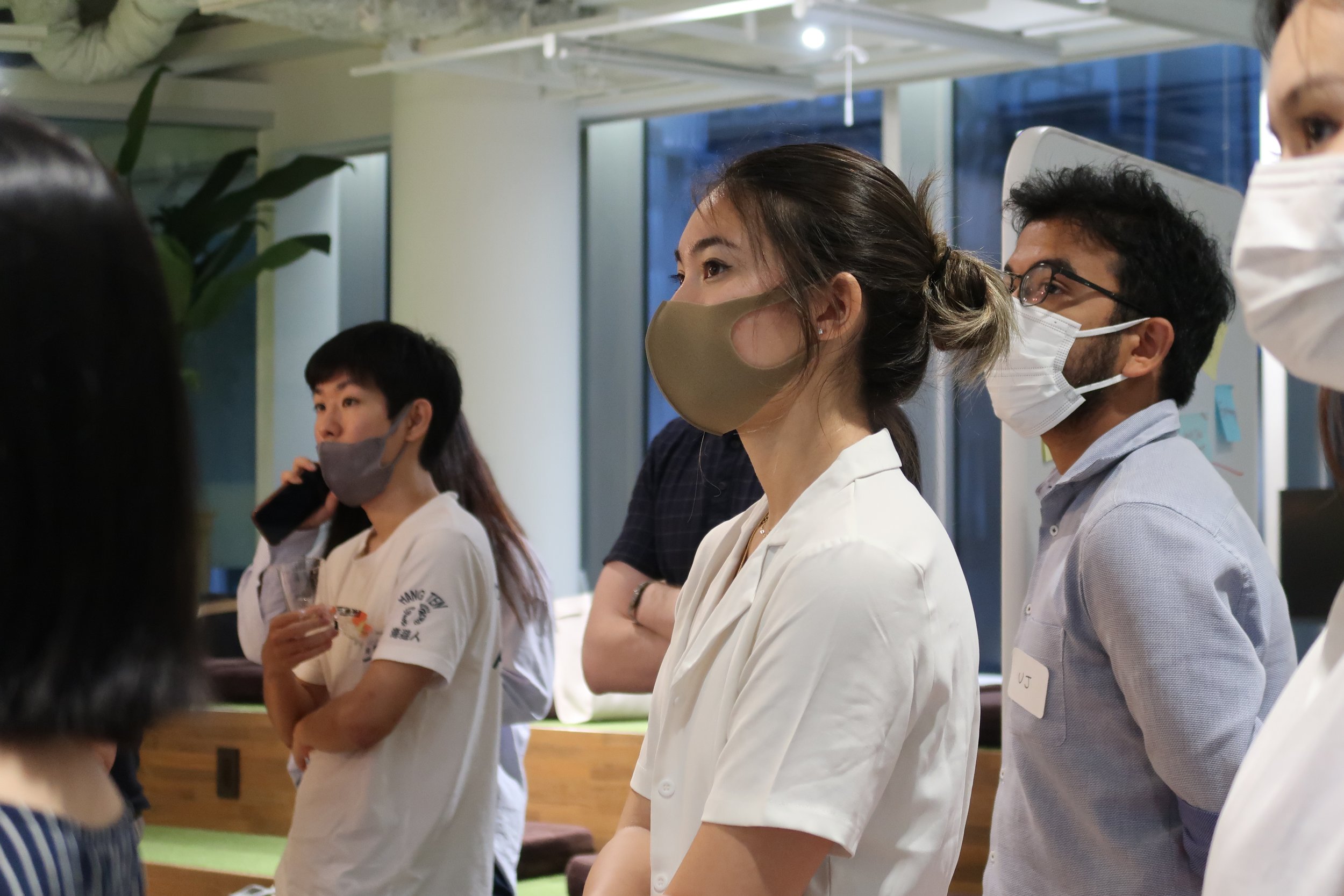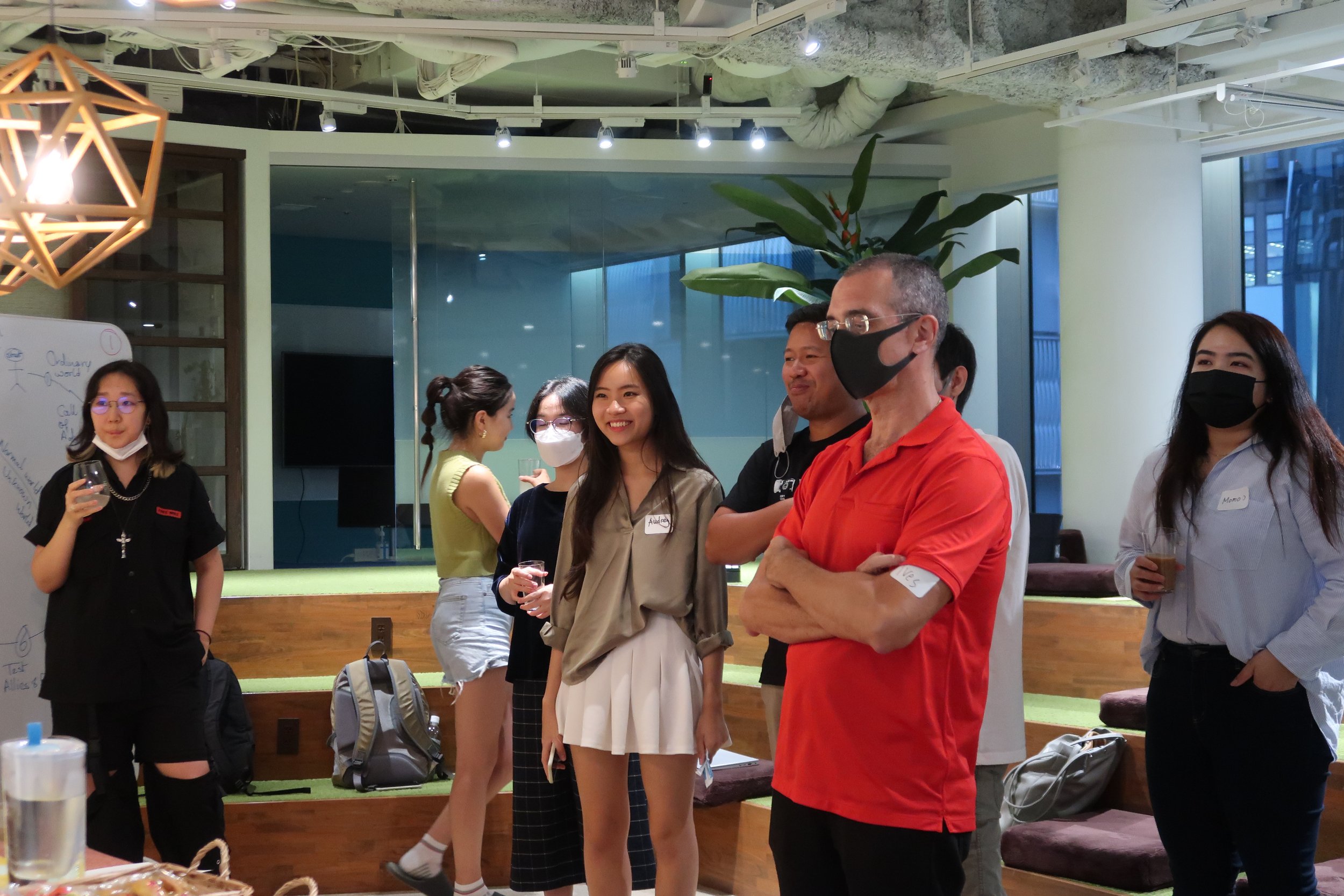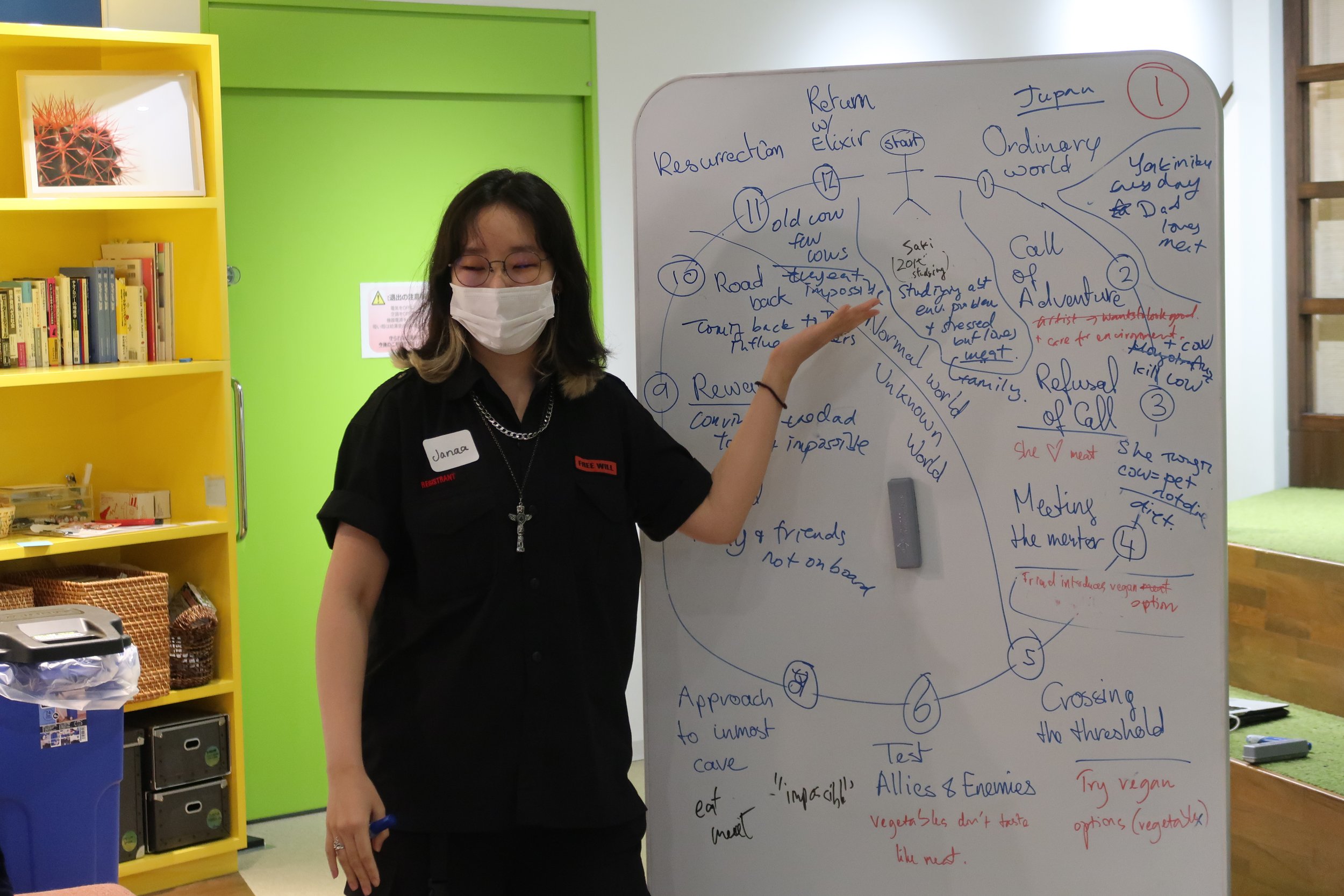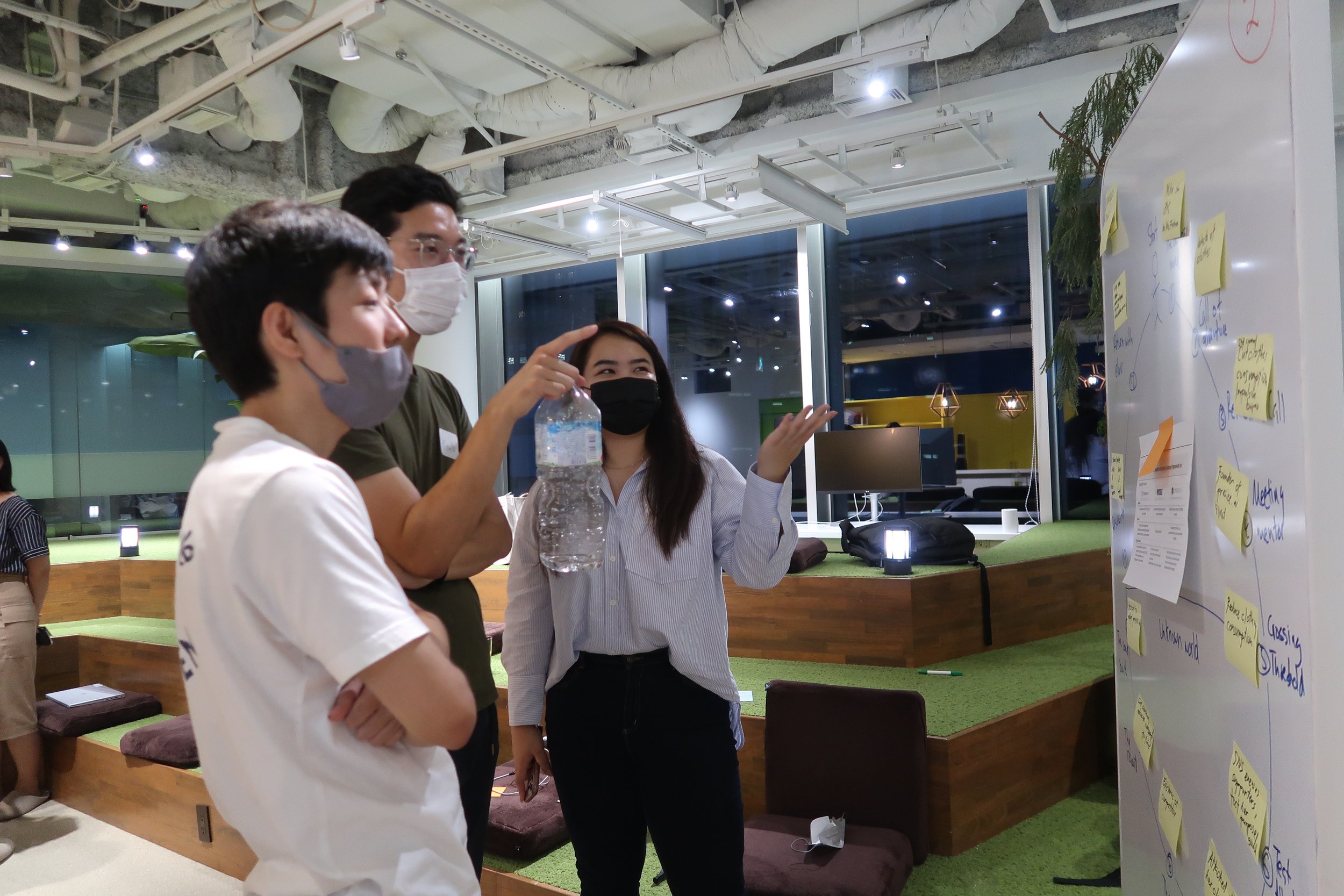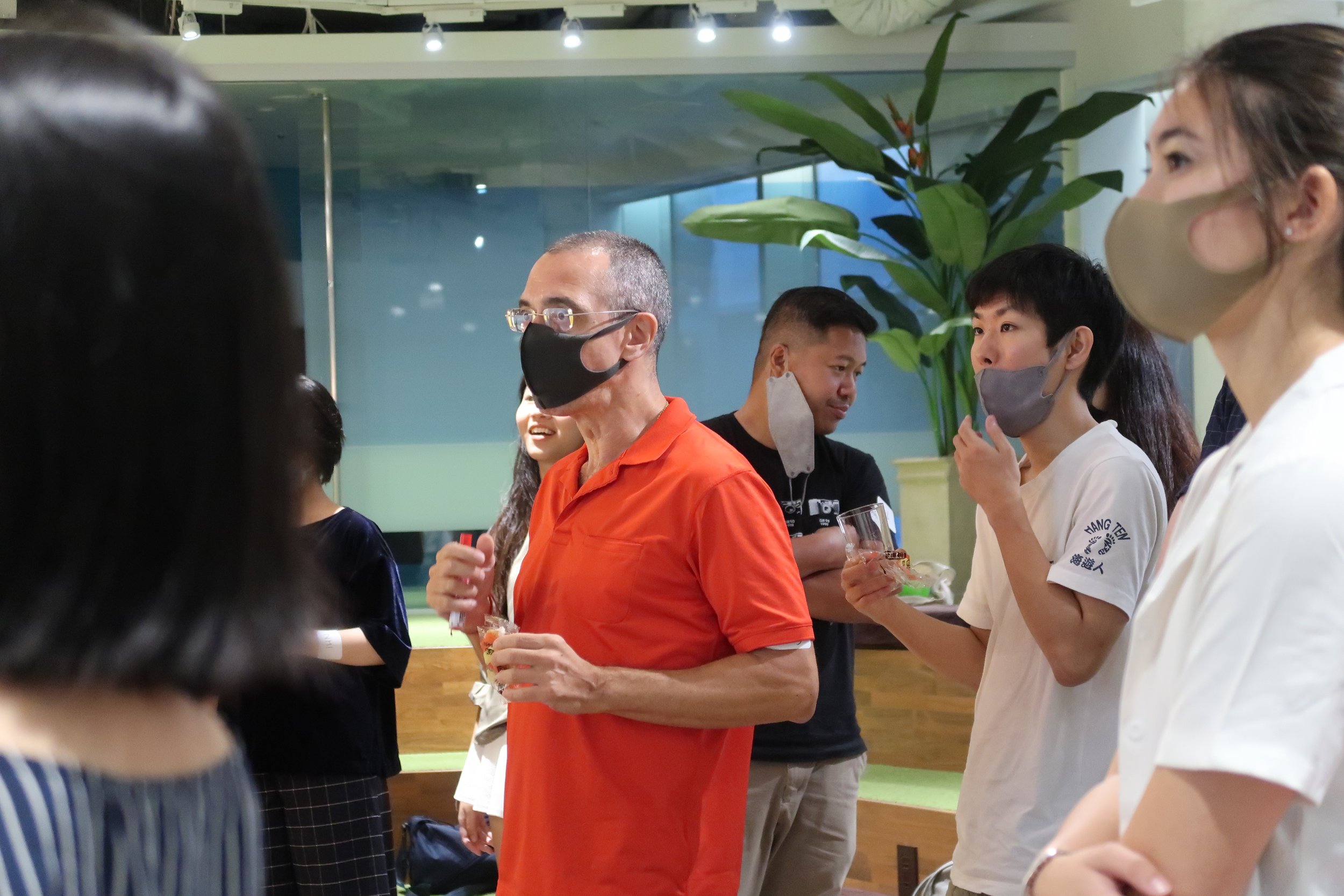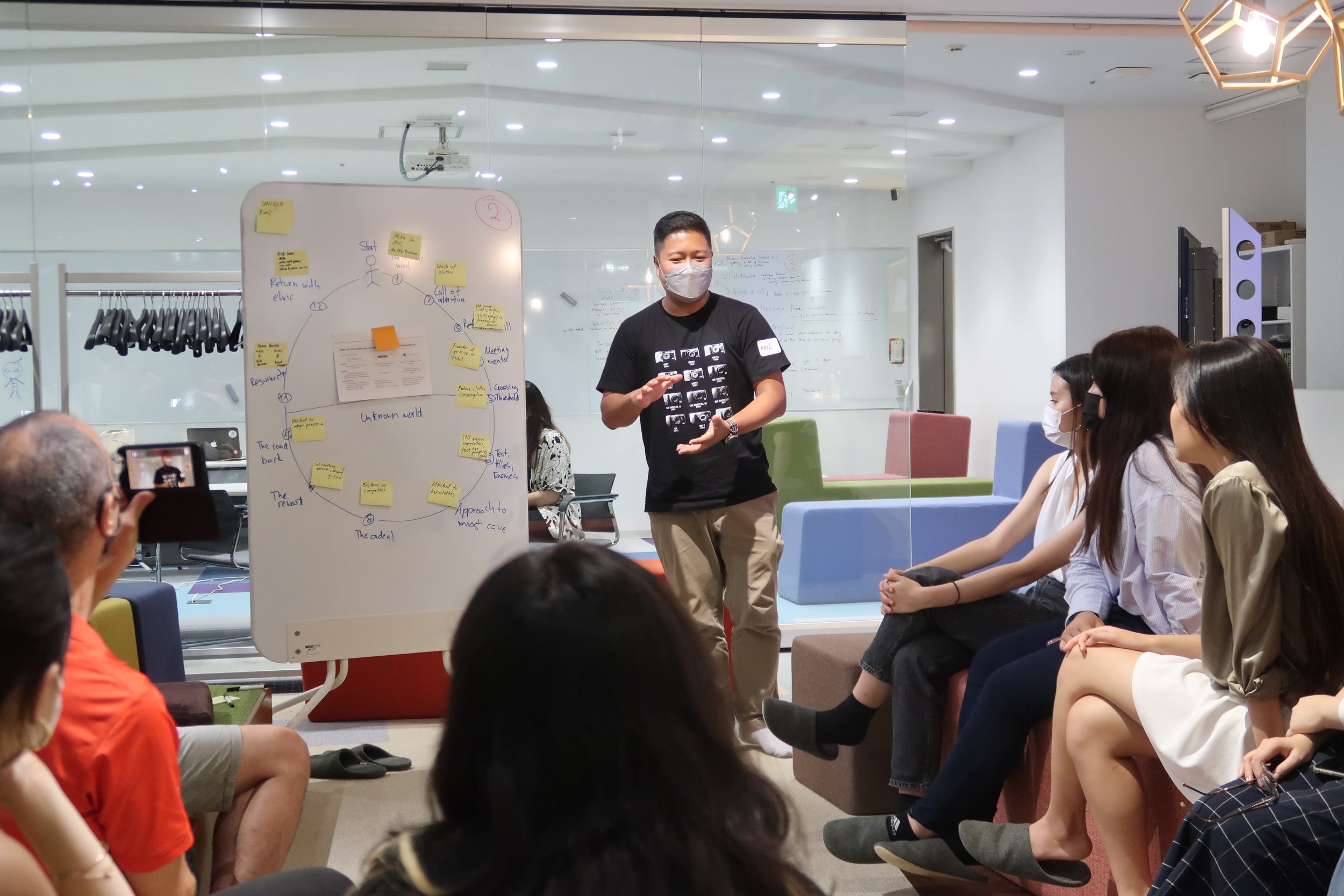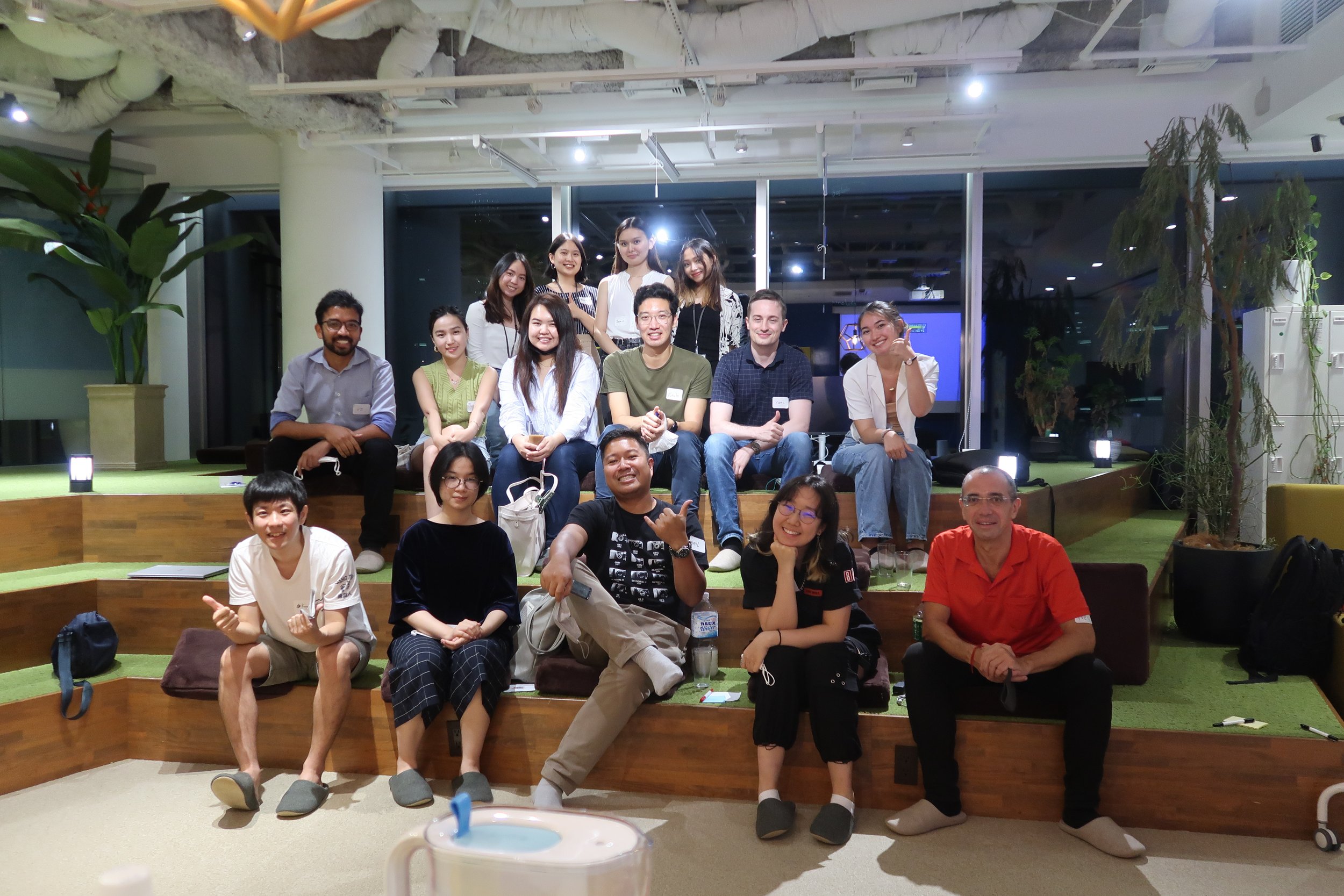Entrepreneur Weekend ISAK 2024 - A Recap
Social entrepreneurship is not merely about starting a business; it's about fostering innovation, creativity, and a mindset geared towards positive change. The recent Entrepreneur Weekend ISAK 2024, held from March 29th to March 31st at UWC ISAK Japan in Karuizawa, Nagano, exemplified this ethos, bringing together the brightest minds and experienced mentors, through a platform for ideation and growth.
Entrepreneurship is not merely about starting a business; it's about fostering innovation, creativity, and a mindset geared towards positive change. The recent Entrepreneur Weekend ISAK 2024, held from March 29th to March 31st at UWC ISAK Japan in Karuizawa, Nagano, exemplified this ethos, bringing together the brightest minds and experienced mentors, through a platform for ideation and growth.
Social Impact Lab Japan (SILJ), represented by Managing Director Quynh Trang Ho Thi, joined other esteemed coaches like Kaion Uehara, Shota Inoue, and Mayuka Yamazaki to provide valuable feedback to students on their business ideas on the second date of the event. The objective was clear: to inspire and cultivate a robust entrepreneurship culture within the UWC ISAK community. Students from various locations, including Osaka, Nagano, Fukui, Tokyo, Kanazawa, and even New Zealand, enthusiastically participated. Their ideas ranged from localizing map data to creating an art-sharing platform, showcasing their diverse interests and entrepreneurial strengths.
Feedback from the coaching sessions reflected the event's success. Participants praised the students' creativity, work ethic, and proactive approach to seeking advice. SILJ's involvement was particularly impactful, as Trang offered specific guidance on financial aspects and provided critical feedback to refine business ideas further.
Moreover, Entrepreneur Weekend ISAK 2024 was also attended by industry leaders such as Hiroko Kono from PayPay Japan, Dice Yukita - Founder & CEO at duhhh, and David Milstein - Managing Partner at Eight Roads Ventures Japan, underscoring its significance in the entrepreneurial ecosystem.
Photo by Dan Nadata - Entrepreneur Weekend ISAK 2024
In conclusion, Entrepreneur Weekend ISAK 2024 was more than just an event; it was a testament to the power of collaboration, mentorship, and innovation. As these young entrepreneurs continue to refine their ideas and pursue their passions, they represent a promising future of business. SILJ is proud to play a pivotal role in supporting such initiatives. With a focus on incubating and accelerating future leaders committed to positive change, SILJ hopes to continue contributing significantly to the development of startup and social entrepreneurship ecosystems not only in Japan but also around the world.
Building International Community in Tokyo Together - Thursday Gathering @ Venture Cafe
During the last Thursday Gathering of 2023 by Venture Cafe at Cambridge Innovation Center (CIC) Tokyo, Social Impact Lab Japan’s Founder and CEO Priya Sultan joined the session “Building International Community in Tokyo Together” as a panelist.
During the last Thursday Gathering of 2023 by Venture Cafe at Cambridge Innovation Center (CIC) Tokyo, Social Impact Lab Japan’s Founder and CEO Priya Sultan joined the session “Building International Community in Tokyo Together” as a panelist.
Photo by Takuo Urushihara - LinkedIn
The session featured other representatives from diverse international backgrounds, including Jason Ball, representing Business in Japan, Robin Takashi Lewis - Co-Founder of Mymizu and Co-CEO of Social Innovation Japan, Erdinç Ekinci Co-founder, CEO of Openfor.co, Inc. and Founder Institute Japan, as well as Takuo Urushihara, Program Manager and Tatsuo Ogura, Program Partner at Venture Café Tokyo.
The panel was focusing on building community for startup ecosystem. The importance of collaboration, diversity, and support network were strongly emphasized during the discussion. Panelists of the session explored unique aspects, challenges, and prospects for shaping a global community in Japan, emphasizing the potential of Japan not only hosting and empowering founders domestically, but also to bridge the market with international talents and resources.
The Year-end Thursday Gathering was attended by more than 360 attendees in total and over 200 individuals in person, making it one of the most successful evenings for the weekly event program.
Photo by Venture Cafe Tokyo - LinkedIn
Empowering Tomorrow's Leaders: SILJ’s Collaborative Workshop and Pitch Competition with AAI 2024 Tsudoi
In a bid to foster entrepreneurship and drive positive change in Africa, Social Impact Lab Japan (SILJ) in collaboration with the Ashinaga Foundation to host the pitch workshop and a dynamic competition for Ashinaga Africa Initiative (AAI) Scholars during the AAI 2024 Tsudoi.
In a bid to foster entrepreneurship and drive positive change in Africa, Social Impact Lab Japan (SILJ) in collaboration with the Ashinaga Foundation to host the pitch workshop and a dynamic competition for Ashinaga Africa Initiative (AAI) Scholars during the AAI 2024 Tsudoi. This event, held under the umbrella of the AAI's commitment to addressing unemployment and social challenges in Sub-Saharan Africa, marked a significant milestone in equipping scholars with essential entrepreneurial skills for their post-graduation journey.
The Collaborative “How to Pitch” Workshop:
More than 40 scholars participated in the interactive workshop session delivered by Ms. Trang Ho - Managing Director of SILJ, designed to develop their business ideas and hone their pitching skills. The hand-on experience aimed to instill a deep understanding of the entrepreneurial process, emphasizing the significance of starting with a personal and significant "Why" (purpose) before delving into the "What" (aim) and "How." The workshop engaged scholars in a brainstorming exercise, challenging them to work collaboratively in groups of 3-5 to craft one mission statement and one vision statement. This not only encouraged peer feedback but also laid the foundation for clear and impactful communication for future entrepreneurs to develop their social enterprises.
The Fundamentals of a Good Pitch:
The workshop went on to outline the seven fundamental components of a successful pitch, focusing on crucial aspects such as problems and solutions identification, target audiences, maintaining conciseness, and having a clear call to action. Five key pitch tips were also shared, providing scholars with practical insights into crafting compelling and effective presentations.
Pitch Practice and Feedback:
The highlight of the event was the pitch practice session, where student groups nominated themselves to present their ideas. Esteemed judges, including Joseph Rutankangwa, the founder of Rwazi, a renowned market intelligence platform, provided valuable feedback. Rwazi, part of the Techstars LA '22 cohort, has garnered attention in TechCrunch, Business Insider, and Fortune for its innovative approach. The practical exercise allowed scholars to apply their newly acquired knowledge, refine their entrepreneurial skills, and compete for a monetary award designated for further entrepreneurial upskilling and resources.
Positive Impact and Testimonials:
The workshop generated overwhelmingly positive feedback from attendees, serving as a strong testimonial to the insights and values shared during the event. Scholars appreciated the practical nature of the workshop, where theory was seamlessly translated into actionable strategies.
Empowering Tomorrow's Change-Makers:
In conclusion, the AAI 2024 Tsudoi's Pitch Competition, in collaboration with Social Impact Lab Japan, exemplified a commitment to empowering the next generation of African entrepreneurs in Japan. By providing practical skills, fostering collaboration, and recognizing innovation, the event laid the groundwork for scholars to make a meaningful impact in addressing societal challenges in Sub-Saharan Africa. The journey towards positive change has just begun, with these empowered entrepreneurs poised to shape a brighter future for the continent and beyond.
From Waste to Wow: Responsible Repurposing for a Sustainable Future - Event Report
The event "From Waste to Wow: Responsible Repurposing for a Sustainable Future" was held successfully on February 29th, 2024 with the aim of promoting sustainable practices and encouraging responsible consumption among junior and high school students in Japan.
The event "From Waste to Wow: Responsible Repurposing for a Sustainable Future" was held successfully on February 29th, 2024 with the aim of promoting sustainable practices and encouraging responsible consumption among junior and high school students in Japan. Organized by SILJ, in collaboration with Yuri Education Center led by experienced teacher Yuri Hirayama, the event featured 13 student pitches, expert insights, and interactive feedback discussions to improve the students’ ideas and delivery.
Student Pitch
Talented students, aged 10 to 18, from Yuri Education Center presented their creative ideas for repurposing waste materials, ranging from transforming eraser dust into useful products, reusing household fabric to implementing food waste composting devices at home. The pitches emphasized the importance of thinking outside of the box and taking responsibility in tackling environmental challenges. Ideas such as creating wooden toys, repurposing paper into digital databases, and recycling paper books also highlighted the potential for sustainable practices to drive positive change in the students' lives.
The event featured insights from sustainability experts Nick Ashley and Trang Ho to give comments and feedback on the students’ pitches. Mr.Ashley, after observing the student pitches, delivered a short speech on the philosophy of waste in nature and emphasized the significance of gratitude. Ms. Ho, Managing Director at Social Impact Lab Japan, shared her experiences in supporting social entrepreneurs and promoting sustainable business practices. Their perspectives underscored the importance of collaboration and innovation in addressing global sustainability issues, from local student-based solutions and ideas.
"From Waste to Wow: Responsible Repurposing for a Sustainable Future" ended with a group discussion where parents and audience were seated with students to provide feedback on what went well and what could be improved for future pitches. The event provided a platform for students, experts, and the general public to come together and explore innovative solutions to environmental issues. Through this collaboration, we hope to inspire individuals to take action and contribute to a more sustainable world. The success of the event underscores the potential for collective efforts to drive meaningful change towards a more sustainable future.
Social Impact Lab Japan was established as an accelerator to ensure that impact entrepreneurs thrive both locally and globally. We incubate, accelerate, and provide investment to impact entrepreneurs - who are driven by purpose - and catalyze them with support through training and mentorship. In Japan, we have partnered with more than 60 universities and educational institutions around the country, hosted +500 events with a focus on social entrepreneurship and the UN Sustainable Development Goals, and acted as a force of inspiration for people to change the world into a better place.
TIF Demo Day Winter 2023: A Showcase of Transformative Education
Founded by Scott Smoler and Kai Childs, The Innovation Fellowship (TIF) is a new international high school for students who want to become successful in life by doing work that is meaningful to them. Hosted on December 3rd, 2023, TIF Demo Day event showcased the incredible progress TIF students made in just three months.
Founded by Scott Smoler and Kai Childs, The Innovation Fellowship (TIF) is a new international high school for students who want to become successful in life by doing work that is meaningful to them. On December 2nd, 2023, TIF held their first Demo Day in Tokyo, providing us an opportunity to see their innovative approach and to watch the students showcase the projects that they were working on.
Hosted on their campus at the Plug and Play Innovation Center in Shibuya with the gathering of students, parents, and the general public, TIF Demo Day event showcased the incredible progress TIF students made in just three months. For example, one of the students built a DIY AI voice assistant called Alex, while the other created an online platform named Entity, designated for showcasing and promoting short films exclusively. Another student developed a website designed to assist drone users in navigating regulations and selecting suitable models. Other ideas presented in the event included a city information blog tailored for teenagers named Teengirl, and an app specifically designed to aid students in finding collaboration partners called Kinship. The projects demonstrated exceptionally well-researched and developed presentations by the students of the program.
TIF Demo Day Winter 2023 Highlights
TIF challenges the conventional "one-size-fits-all" model by offering a personalized curriculum tailored to each student's interests and driven by real-world projects. This departure from standardized education allows students to explore their passions and stay engaged throughout the school day. Additionally, the students are empowered to create greater impact in the society, as their purpose-driven interests will enhance their motivation to be innovative and become exceptional in their fields.
“If you can wake up everyday and do what you care about, with people you like, what you are good at, what you could be paid for, and what adds value to the world, that’s a great life” - said Scott Smoler, summarizing the five pillars that make up the guiding mission of TIF.
A Launching Pad with Holistic Guidance
Mao Sano, an attendant at the event commented: “I was impressed by how confident and happy all the students seemed to be speaking.” Another commenter, Mark Bivens, Managing Partner at Shizen Capital, shared his thought through his LinkedIn that witnessing TIF students has reinforced his optimism for the future, and congratulated the team on the success of the event.
TIF's dynamic academic curriculum also ensures that students are covering all of the essential subjects for college, personalized to their goals. Graduates leave with a standout portfolio, a comprehensive transcript, self-awareness, and entrepreneurship skills – essential components for college admissions and life success.
Watch TIF Demo Day Winter 2023 [Full Event]
Empowering the Next Generation for Life Success
The TIF Demo Day Winter 2023 provided us with a comprehensive overview of The Innovation Fellowship's unique educational model. By focusing on personalized guidance, project-based learning, and effective mentorship, TIF aims to support student’s success in their future pursuit. The emphasis on college readiness, coupled with the development of a well-rounded skill set, positions TIF as a trailblazer in shaping students not only academically but also for a successful and meaningful life beyond school.
The Innovation Fellowship accepts applications on a rolling basis. Interested individuals can reach out to jointhefellowship@innovationfellowship.org or visit their website: https://www.innovationfellowship.org/ for more information.
TIF's commitment to impact extends beyond the classroom through its collaboration with industrial experts and leading partners across different sectors, including Social Impact Lab Japan (SILJ). At SILJ, we incubate, accelerate, invest and support impact entrepreneurs locally and globally. With partnerships across 60+ Japanese institutions, +500 events, and a focus on social entrepreneurship and UN Sustainable Development Goals, SILJ strives to act as a force of inspiration for people to change the world into a better place.
Photos and Videos Credits: The Innovation Fellowship, 2024
Urban Regeneration: Building Sustainable Societies - Event Report
On December 21, 2023, Social Impact Lab Japan successfully organized "Urban Regeneration: Building Sustainable Societies." The panel featured experts from various backgrounds to discuss challenges and proposing solutions urgent urban issues facing Japan and other places around the world. The ensuing workshop saw diverse pitches, showcasing collaborative solutions, fostering community, and highlighting the power of collective effort in shaping a sustainable future.
In 2023, Tokyo stood as one of the world's most densely populated cities, hosting around 37 million residents within its greater metropolis area. While this population boom presents Tokyo with unique challenges, it reflects a broader global trend. Urbanisation rates in Tokyo have soared to an astonishing 91.7%, leaving just a fraction of Japan's population residing in rural areas, which on the other hand, were suffering a rapidly declining rate.
This trend isn't exclusive to Tokyo. By 2050, projections indicate that two-thirds of the world's population will be urban dwellers. Cities, despite covering only 3% of the Earth's surface, drive 80% of energy consumption and contribute a staggering 75% of carbon emissions. Astonishingly, cities generate a colossal 3.4 billion tons of solid waste annually!
Recognizing the urgency of addressing mass urbanisation, Social Impact Lab Japan held the "Urban Regeneration: Building Sustainable Societies" on December 21st, as a platform to amplify awareness and glean insights from industry experts, fostering innovative solutions to tackle these challenges through a collaborative workshop.
Panelists & Discussion
After our Founder and CEO Priya Sultan gave a greeting speech to our audience, SILJ was joined by a group of incredible professionals for the event, including;
Hajime Mori, the ambassador of Minato City’s Board of Tourism
Stuart Kay, co-founder and managing director at GreenPlace
Riela Provi Drianda, associate professor at Waseda University
David U. Socol De La Osa, assistant professor at Hitotsubashi University
The panelists were given the stage to briefly present their professional backgrounds and work in the field of urban development, regeneration, and planning.
Photos by Abdou Rachad Moussa
Mr. David discussed the complexity of urban design that’s needed to be in place for maintaining a sustainable living environment, including which key resources need to be distributed and developed in the community that can help people thrive. As energy security is an issue, Mr. Mori, who had extensive working experience in the energy sector, referred to the challenge of reducing carbon emission in Japan, and offered the solution to use renewable energy to revitalise rural areas with new job opportunities.
Photos by Abdou Rachad Moussa
While Mr. Kay shared critical perspectives on governmental infrastructure in meeting the needs of local residents, he also offered his diverse insights in real estate development, financial management for decarbonization for large scale projects that could be beneficial to the regenerative efforts. As Japan is facing multiple challenges with a growing ageing population and a drain of young workers, in addition, Professor. Drianda discussed the loss of employment opportunities in rural areas that affects the younger generation, while introducing the work of her students - Machigo, a potential solution for promoting cultural tourism through travel kits.
The panellists were given a chance to further explore the role of urban designers, social entrepreneurs, and policy makers in responding to new emerging trends of urbanisation, pressing the urgency for all stakeholders to take actions.
As Mr. David aptly put, “The challenge is holding back a tide that is inevitable.”
Photos by Abdou Rachad Moussa
Within the panel discussion and open Q&A session with the audience, both Professor Drianda and Mr. Kay emphasized that in order to revitalise rural areas and create sustainable lifestyles that don’t require movement into metropolitan areas, the public and private sector must centralise focus on the needs and wants of the youth.
Photos by Abdou Rachad Moussa
In response, Mr. Kay added, “We always think from the perspective of urban designers - but it’s time to provide spaces for young people to define their future. One of the key things about urban design is public consultation, that is; understanding the client”
Photos by Abdou Rachad Moussa
As Mr. Mori stated, “Rural revitalization is the most important focus in Japan now.”
Photos by Abdou Rachad Moussa
Workshop
The panellist discussion provided the perfect leverage for us to move on to the special workshop for the audience. The spotlight now turned to those who had been patiently learning from our professional guests; our audience was given the chance to showcase their own understanding of the discussion and greater theme of urban regeneration. A total of six teams were created, each given 30 minutes to prepare a short, 2-minute pitch for their innovative ideas on how to improve business services, or policy changes in the area that they were particularly interested in.
Photos by Abdou Rachad Moussa
The responses and pitches from each team were diverse and incredibly creative - such as smart city agriculture, customised technology to manage delivery of packages, community empowerment initiatives such as city pop-ups for rural businesses, and urban-rural exchange programs.
Each idea stood as a testament to the success of the event - members of each time, coming from different backgrounds and areas of study, were able to come together to collaborate and curate ideas from every aspect of urban development and tackle the challenges provided to them.
Photos by Abdou Rachad Moussa
Stemming from the exhilarating workshop and panellist discussion, the networking session was bustling with new connections and a drive to continue emergent conversations surrounding the nature of our cities - a fitting image situated in the middle of Tokyo. It truly felt that the event could continue for the remainder of the evening.
Photos by Abdou Rachad Moussa
Beyond showcasing inventive and original ideas through the workshop, the event nurtured a sense of community and collaboration between our panellists and audience. It highlighted the potency of teamwork and shared commitment in driving meaningful social change, underscoring the endless potential of individuals to unite to address urgent issues in a rapidly urbanising world.
Photos by Abdou Rachad Moussa
In conclusion, the success of this event was made possible by the invaluable contributions of the experts on our panellists, the Social Impact Lab Japan team, including our interns, passionate volunteers, and event team. Moreover, an event is incomplete without the engaged audience members that SILJ was honoured to host. As always, we would like to conclude by reminding everyone that Social Impact Lab Japan has one objective: to inspire social change. We provide a platform for participants and professionals to lead innovative problem-solving initiatives. Continue to join us in this transformative experience, contribute your ideas, and actively participate in shaping a sustainable future. Your presence and engagement will truly make a substantial difference. We eagerly anticipate your attendance at our next event!
The Role of ESG in Startups
ESG isn't just a trend—it's a path to aligning startups with global sustainability goals, attracting investment, and fostering a better world. From ESG integration at Lifetime Ventures and SILJ's impactful approach, we explore the journey, challenges, and the growing landscape of ESG in venture capital in Japan.
1. ESG Origins
The idea of integrating ESG principles in business practices first originated from the then United Nations (UN) Secretary-General Kofi Annan, whose vision was to create "a more stable and inclusive global economy." To fulfill this vision, the UN Global Compact was launched in 2000, which oversaw the publishing of a report in 2004 linking ESG adoption to greater corporate competitiveness in an increasingly globalized world.
While the jury is still out on whether any of the current implementations of ESG positively correlate with financial performance, companies should recognize their responsibility in increasing (or at least not diminishing) the stability and inclusiveness of the global economy.
2. The Role of ESG in Venture Capital
Ever since the first ESG report was published, there has been a growing appetite in public markets to increase ESG-related capital allocation, with PWC projecting a compound annual growth rate of such investments by over 12% until 2026. The report finds that most surveyed asset managers now consider ESG part of their fiduciary duties to shareholders - even amidst rising ESG compliance costs.
Meanwhile, this trend has also trickled down into the broader venture capital industry. It is driven by investors who recognize the importance of caring about the environment and society not just for its own sake but also to attract increasingly ESG-aware founders.
Communities such as VentureESG (of which Lifetime Ventures is a part) and the UN Global Compact's recent report on "Responsible Investment in Venture Capital" validate the growing interest. Despite the unresolved challenges, such as unstandardized ESG guidelines, which can be seen in both public and private markets, venture capitalists can play a meaningful role in having a positive impact on the environment and society. One of the ways startup investors can do so is to enable portfolio companies to understand and implement ESG best practices in their operations that lead to growth in their enterprise value.
3. ESG at Lifetime Ventures
At Lifetime Ventures, we care deeply about investing in startups with lasting impact in a world where humans and our planet can prosper for generations to come. Beyond our advocacy for meaningful ESG integration through communities as VentureESG, we integrate ESG into our investment process from due diligence to portfolio support process to provide an end-to-end service to ensure ESG in our portfolio investments.
More specifically, founders fill out our ESG Due Diligence Survey for us to understand which risk exposure they have in terms of their impact on the environment, society, and governance. While this process is not meant to make or break the investment decision, it helps us assemble an ESG action plan once the investment is made.
Here are some of the areas we ask in the ESG DDQ:
Once these are understood qualitatively and quantitatively, we help portfolio companies implement measures to improve their ESG profile. This is illustrated best by providing an example from one of our past investments.
For our climate-tech portfolio, we have prioritized the transparency and public accountability of the Scop 3 GHG measurement. We have created a climate policy for the climate-tech startup to implement both internally, as part of their operations, and externally, as part of their hiring process. While this is a light process given the pre-seed stage of the climate-tech startup, this policy implementation since the earliest stage has ensured that climate is engraved within their DNA and made them ready to further improve the measurement and reporting for the next stage.
4. SILJ Approaches to ESG in Venture
At Social Impact Lab Japan (SILJ), early-stage startup founders are strongly encouraged to incorporate an impact-focused approach to Sustainable Development Goals (SDGs). While the SDGs framework emphasizes the collective objectives of sustainability on the national and international level, the implementation of ESG principles helps businesses take action and create impacts that contribute directly to these macro goals. The 17 SDGs can be used to categorize ESG reporting and incorporating ESG in business workflows can often lead to long-term financial value, as well as provide competitive advantage for early-stage startups. SILJ encourages startups to embrace ESG for several compelling reasons, including access to ESG investment, talent attraction, and retention, as well as improved brand reputation. Incorporating ESG policies early on can attract a broader range of investors. In contrast, non-ESG-compliant startups might face higher risks in the form of legal issues, PR damage, or public distrust in the future. Additionally, the implementation of ESG policies would also help the startups provide a better and healthier working environment for all stakeholders involved.
Some of the notable startup companies we have worked with that implement ESG principles include Omohibito.co.ltd - a company that was founded by Moe Kaneko, which provides caregivers products and services that contribute to the social welfare of the aging demography in Japan; Revival LLC, a collaborative project by Huda Mohammed Faisal and Meguriwa that seeks to bridge Japanese and Bangladeshi textile heritage by crafting dresses, fabrics, and shoes from garment waste and employing local female labor force for the production process.
5. ESG Investment Outlook
The market for ESG investments is growing, from green bonds, social bonds, sustainability bonds, loans to the renewable energy sector, to regional revitalization funds. Japan Post Bank, for example, has set ambitious targets for ESG-themed investments, reflecting the rising importance of such initiatives. Impact Fund, such as GLIN Impact Capital or M-Power Partners, provides ESG investments in growth-stage companies that focus on social missions. JPX (Japan Exchange Group) has also actively advanced sustainability efforts by formulating Japan's Corporate Governance Code, providing ESG-related indices and ETFs, and selecting listed companies that promote women empowerment or employee health. More and more support for ESG integration from governments and the public sector is becoming available, which is actively promoting sustainable finance and encouraging asset managers and owners to allocate investments to companies that address social issues, such as through the proposal of new guidelines on ESG Public Funds by Japan Financial Services Agency (FSA) along with the provision of Code of Conduct for ESG Evaluation and Data Providers in December 2022. This support includes strengthening financial functions that facilitate sustainability initiatives and developing policies to enhance asset management capabilities for the country while providing assistance for the private sector to become successful and efficient in its ESG pursuit.
6. Conclusion
In essence, embracing ESG allows startups to align with global sustainability goals, attract investors and talent, enhance their brand image, and reduce legal risks associated with non-compliance. ESG and purpose-driven strategies can be synergistic, helping startups create a competitive advantage while contributing to a better world.
About Lifetime Ventures:
Lifetime Ventures is a Yokohama and Okinawa-based pre-seed/seed-focused venture capital firm that supports entrepreneurs aiming to create long-lasting businesses. Lifetime Ventures has invested in >50 startups to date, including Rehab for JAPAN, an AgeTech company that re-designs the lives of the elderly through rehabilitation, and UUUO, a B2B platform company that creates new distribution and resource management models for the fishing industry.
About Social Impact Lab Japan:
Social Impact Lab Japan was established as an incubator to ensure that impact entrepreneurs thrive both locally and globally. SILJ incubates, accelerates, and provides investment to impact entrepreneurs - who are driven by purpose - and catalyze them with support through training and mentorship. In Japan, SILJ has partnered with more than 60 universities and educational institutions around the country, hosted +500 events with a focus on social entrepreneurship and the UN Sustainable Development Goals, and acted as a force of inspiration for people to change the world into a better place.
Waste Revolution: Innovations in Recycling and Sustainability - Event Recap
Amidst the ongoing climate crisis, waste mismanagement practices pose significant environmental threats, with improper disposal leading to floating litter and mass plastic burning. Recognizing the gravity of these challenges, the Social Impact Lab Japan organized the event “Waste Revolution: Innovations in Recycling and Sustainability” on October 26th, 2023.
In 2023, it was anticipated that the world would generate approximately 158 million tonnes of plastic waste and an alarming 43% of the total was expected to be improperly managed after disposal. This mismanagement would lead to an additional 68 million tonnes of plastic pollution, further exacerbating the already concerning issue of plastic waste accumulating in our environment. In fact, based on a fiscal report from 2021, Japan single-handedly generates almost 41 million metric tonnes, with the majority of it coming from household waste, underscoring the individual contribution we make to this growing waste issue.
Amidst the ongoing climate crisis, waste mismanagement practices pose significant environmental threats, with improper disposal leading to floating litter and mass plastic burning. This urgency underscores the critical importance of addressing recycling challenges, minimizing landfill use, and promoting responsible consumption, making waste management a pivotal aspect of sustainability and social impact efforts.
Recognizing the gravity of these challenges, the Social Impact Lab Japan organized the event “Waste Revolution: Innovations in Recycling and Sustainability” on October 26th, 2023. The event aimed to bring together pioneering entrepreneurs, experts, innovators, and enthusiasts who were making proactive efforts toward sustainable waste management.
In light of increasing environmental concerns surrounding sustainable waste management, this event gathered a cadre of determined entrepreneurs leading the way in creating a waste-free world through their innovative start-ups and ideas.
Lawrie Cate, the visionary CTO of the Mymizu app, took the stage to highlight a pressing concern of growing plastic waste, providing a platform to lead people to about 200,000 water refill points globally.
"By 2050, our oceans may contain more plastic than fish," With determination, he shared, "We've spared 6 million plastic bottles from becoming waste."
Mymizu's triumphs mark a monumental leap toward a sustainable future, combatting the climate crisis.
Mr. Philip Nguyen, the dynamic co-founder and CEO of Sustainability Page comes in with the mission to consolidate sustainability knowledge into one AI-powered platform. Sustainability Page offers a hub for insights and solutions from a vibrant community. Philip, a seasoned entrepreneur with 15 years of academic expertise in Japan, embodies resilience and innovation. His entrepreneurial journey showcases his commitment to making a difference. Already in his third startup venture, he continues to drive the sustainability agenda forward.
Yuri Hirayama, a passionate educator and manager at Yuri Education Center, is our third inspiring presenter. Yuri's journey began with a simple observation: the excessive use of a global product, regular car tires. Drawing on her experiences working with the Tarahumara indigenous groups in Mexico, she envisioned a transformative solution to recycling tires into sandals and providing footwear for women working in challenging conditions. Her plan not only addresses a pressing issue but also empowers these women through craftsmanship, creating jobs and sustainable opportunities. Yuri's vision unites cultures through traditional craftsmanship, fostering a sustainable world where innovation meets compassion.
Taro Okamura, the visionary head of ESG at Valuence Holdings, sheds light on the intriguing intersections between luxury, the second-hand market, and the circular economy. What makes this story even more compelling is the unexpected journey of Valuence's founder, Shinsuke Sakimoto, a former football player turned innovative entrepreneur, proving the limitless potential within any profession. Oka's groundbreaking approach emphasizes the environmental impact assessment across a product's life cycle. By championing the reuse of luxury items and highlighting their timeless value through "Resale Impact," he challenges conventional norms, urging us to rethink our relationship with products and the planet.
Each panelist was given the opportunity to present their ideas to an enthusiastic group of guest participants, who then leveraged the newfound information to engage in a rigorous discussion. What happens to the tires after use? What are the repercussions of repurposing waste? Are regulations stifling? The discussion highlighted the complexities of waste management, and the tireless and tedious steps needed to prevent a positive objective from turning into a negative impact. The panelists opened up on the technical challenges they have faced operating in a world with capital aims. We received insights into their run-ins with corporate organizations, governmental reception collaborations with social enterprises, and the larger conversations surrounding greenwashing and mindset obstacles.
Social Impact Lab Japan often stresses the importance of an interactive environment for innovative solutions. For the workshop session, the participants split into two groups to identify waste management issues in our daily lives and brainstorm practical solutions. Group 1 focused on enhancing craftsmanship skills outside of a traditional school format, fostering creativity and entrepreneurial spirit. Group 2 tackled excessive plastic packaging by advocating eco-friendly alternatives, and promoting sustainable choices for everyday items.
The event's success stands as a testament to the collective dedication and effort put forth by a diverse community of individuals and the collective action to promote sustainable waste management. The invaluable contributions of the Social Impact Lab Japan experts, interns, dedicated teams, passionate volunteers, engaged audience, and insightful panelists were instrumental in shaping the event's positive outcomes. Their hard work, enthusiasm, and willingness to collaborate played a pivotal role in creating an atmosphere of creativity and shared learning. The event not only provided a platform for innovative ideas towards a sustainable world but also fostered a sense of community and collaboration, emphasizing the power of teamwork and collective commitment in driving positive social impact.
There is a never-ending potential for meaningful change when individuals come together to address pressing issues and work towards a sustainable and inclusive future. The events organized by Social Impact Lab Japan are designed with a clear objective: to inspire actionable takeaways for the audience. We welcome networking opportunities between industry pioneers, such as the guest panelists from this event, and for our participants to be given the opportunity to be at the forefront of innovative problem-solving. Be a part of this transformative experience, contribute your ideas, and actively engage in shaping a sustainable future. Your presence and active participation will make every bit of a difference. We truly hope to see you at the next event!
Fashion for Change: Igniting Social Impact in the Fashion Industry - Event Report
On September 5th, 2023, the Social Impact Lab Japan hosted an interactive pitching event that aimed to address one of the most pressing challenges of our time – the environmental impact of the fashion industry. Titled "Fashion for Change: Igniting Social Impact in the Fashion Industry," this event brought together a diverse group of experts, entrepreneurs, and fashion enthusiasts to explore innovative solutions to the industry's sustainability issues.
The fashion industry has long dazzled the world with its creativity, innovation, and allure. However, beneath the glamourous facade lies a stark reality: the fashion industry is one of the largest contributors to environmental degradation around the world. With alarming statistics showing its detrimental impact on our planet, the need for change has never been more urgent. This pressing issue was the focus of the "Fashion for Change: Igniting Social Impact in the Fashion Industry" event held at Social Impact Lab Japan on September 5th, 2023.
The Fashion Industry's Environmental Footprint
Before delving into the event, it's crucial to understand the gravity of the problem at hand. The fashion industry is responsible for up to 10% of the global CO2 output, accounts for 1/5 of the 300 million tons of plastic produced globally each year, and releases the equivalent of 50 billion plastic bottles into the ocean annually from washing clothes. Moreover, it is responsible for 8-10% of humanity's carbon emissions, surpassing all international flights and maritime shipping combined, and contributes to around 20% of industrial wastewater pollution worldwide. These staggering facts underscore the dire need for change within the industry and call for action on a large scale.
A Beacon of Change: Social Entrepreneurship
To address these pressing issues, the event brought together a diverse group of experts and fashion startups who are passionate about entrepreneurship, sustainable fashion, and fashion design. John Kojiro Moriwaka, Founder & CEO of Silicon Valley Ventures, brought his expertise in global entrepreneurship and startup investment to the discussion. Miona Kitano, an executive member of Rethink Fashion Waseda, represented the perspective of students working towards sustainable fashion awareness and collaboration. WK Jackson, Partner at House.Tokyo, provided unique insights into fashion brand management and production. By revitalizing department stores or even pop-ups, Jackson believed, we could help the design and fashion industry break the solidified ceiling made up of only well-known brands on the markets and empower the ecosystem of new designers, hence fostering innovation and creativity that would be beneficial to change in the industry.
Rising Tide of Sustainable Fashion
One of the key takeaways from the event was the promising rise of sustainable fashion. According to Statistica, the global market for secondhand and resale apparel is rapidly expanding, projected to reach a value of $351 billion by 2027. Additionally, the revenue share of sustainable apparel worldwide is on the rise, indicating a growing demand for eco-friendly fashion options.
The event introduced several inspiring fashion startups that showcased their innovative approaches to sustainability. For example, Elemental Peru by Estefania Sangama is on a mission to make sustainability the default choice by offering beautiful garments handmade by Peruvian mothers and seamstresses who work from home. Revival, a collaborative project by Huda Mohammed Faisal and Meguriwa; seeks to bridge Japanese and Bangladeshi textile heritage by crafting dresses, fabrics, and shoes from garment waste. MESCHAN, designed by Catalina Vallejos, focuses on upcycled wearables, merging luxury fashion with waste materials such as snack packages and worn-out materials. Lua, conceptualized by Alice Ogasawara and Reina Yamada, upcycles disused or stained clothing using Japanese indigo dyeing techniques. Re-List, developed by Ryuhei Kumazawa, employs AI-powered outfit-driven resale of second-hand clothes, offering a sustainable alternative to online fast fashion. All the pitch presenters have demonstrated great passion for initiating new changes in the industry and provided proof of execution, as well as determination to create an impact not just for the consumers but for all the stakeholders involved.
Despite initial technical setbacks, the event received positive feedback from the audience, who appreciated the opportunity to discuss pressing issues facing the fashion industry and explore innovative solutions. An insightful panel discussion and a networking session followed the pitch session was facilitated where the attendees had the opportunity to engage in direct dialogues with the event's commentators, gaining valuable insights and forging connections within the sustainable fashion community. "Fashion for Change: Igniting Social Impact in the Fashion Industry" was a crucial step towards transforming the fashion industry into a force for positive change, one sustainable garment at a time.
In a world where the fashion industry has long been criticized for its environmental impact, we hope that events like this provide hope and inspiration. As the global market for secondhand and sustainable apparel continues to grow, the fashion industry has the potential to redefine itself and contribute positively to a more sustainable future.
We are immensely thankful for all of the audience's active participation in the event, and their enthusiasm in supporting the startup founders to nurture their ideas. The event was organized by Social Impact Lab Japan, a hub for impact entrepreneurs. Our mission is to incubate and accelerate ideas for social enterprises that improve people’s lives. By bringing together like-minded individuals and organizations, Social Impact Lab Japan commits to continue driving a generation to pursue impactful careers and lifestyles.
Pitch Feedback Session: Empower Visionaries Social Impact Startup Leaders
The Social Impact Startup Pitch Feedback Session was held with the aim of providing valuable insights and guidance to social impact entrepreneurs seeking to make a positive change in society. The event brought together a diverse group of participants, including university students, startup founders, and industry experts, creating a vibrant and collaborative environment for sharing ideas and fostering innovation.
The Social Impact Startup Pitch Feedback Session was held with the aim of providing valuable insights and guidance to social impact entrepreneurs seeking to make a positive change in society. The event brought together a diverse group of participants, including university students, startup founders, and industry experts, creating a vibrant and collaborative environment for sharing ideas and fostering innovation. We were honored to have Mr. Seira Yun - Founder and CEO of Socious.io, a talent marketplace that connects purpose-driven professionals with impact organizations through AI matching, and Ms. Rebecca Chai, a Venture Associate at Plug and Play Japan, who had work experience at investment firms as well as open innovation support between large companies. Both of our guest commentators were impacted angel investors with strong passions in the field of social startups.
Our entrepreneurs represent various social impact startups at different stages across different industries, including education, healthy food and beverages, 3D printing application, cosmetics, and pet supplies. Their ventures and ideas were showcased through their mission, vision, business model, and societal problems they aimed to solve.
Kaichibin, presented by Ms. Naoko Fujihira, provided an online platform solution to match children with autism and ADHD with teachers and experts for educational support. The startup has the potential to address the special needs of more than 200 million children worldwide who face difficulties with learning and concentration. Also joining us online, Mr. Philipp Schwab introduced Chance To Grow as a platform aimed at connecting NGOs and corporate partners from international and local levels. The startup aimed to make milestones and impact visible and transparent, particularly focusing on developing countries like Vietnam.
On the stage, Ms. Deniz Benba brought to our audience an engaging in-person talk about Sweet Dream Baskets, a unique business concept that combines the pet supply industry with art, recycled materials, and social impact. The startup aims to create employment opportunities for disadvantaged communities while promoting sustainability and creativity. Following with 3D Printing Corporation, Mr. Alexander S. De Vore proposed to digitize the supply chain to localize manufacturing through 3D printing technology. The company has the potential to provide several advanced tools that could help address the need for healthcare devices, energy sourcing, and space development.
Our session continued with Skai Beauty’s CEO Steve Bidinger pitching his direct-to-consumer (D2C) cosmetic brand, focusing on clean and sustainable beauty products. The startup emphasized the importance of ethical sourcing, environmentally friendly packaging, and product ingredient transparency. Mr. Isuru Subasinghe from Serendipity Asia presented the company’s concept of affordable and healthy food and beverages. The startup emphasized the goal of making nutritious options accessible to all socioeconomic backgrounds.
During our final round of presentations, Mr. Kai Childs delivered a passionate pitch on The Innovation Fellowship, which proposed a new international high school aimed at empowering students to pursue meaningful work. The startup highlighted the importance of experiential learning and mentorship, as well as providing inspirational case studies of students' successes. Justina Emoh, a student at Waseda University, presented Utilization Nigeria, which is a startup aimed at educating and empowering youths through employment opportunities using local resources to make beverage products. All the pitches were followed by a short Q&A and feedback session from the commentators, allowing participants to seek clarifications and delve deeper into the startups' strategies. They shared their expertise, asked critical questions, and offered constructive suggestions to enhance the viability and impact of the presented startup ideas.
The SILJ team hopes the event to be a great opportunity to foster a sense of community among social impact entrepreneurs, creating a supportive environment for sharing experiences and challenges. With a focus on driving positive change in various sectors, the session unfolded as a catalyst for transforming visionary concepts into actionable solutions, as well as empowering businesses that have a strong potential for social impact. We are extremely thankful to our guest commentators, our pitch presenters, as well as our engaging audiences to come and join the session!
Impact Investing: Transforming Capitalism for a Better Future
In recent years, the concept of impact investing has gained significant traction worldwide. It represents a paradigm shift in the way investors approach their financial decisions by considering not only financial returns but also the positive social and environmental impact of their investments. Our “Social Impact through Investing: Values and Strategies” event shared the perspectives of our honorable investors on impact investing, its emphasis, and its growing importance in today's world.
In recent years, the concept of impact investing has gained significant traction worldwide. It represents a paradigm shift in the way investors approach their financial decisions by considering not only financial returns but also the positive social and environmental impact of their investments. Our event “Social Impact through Investment: Values and Strategies” hosted at Venture Cafe, CIC Tokyo on May 18th, Thursday Gathering, shared the perspectives of our honorable investors on impact investing, its emphasis, and its growing importance in today's world.
Eriko Suzuki, an experienced investor who leads KIND Capital, highlighted that impact investing has been flourishing in Japan for over 20 years. She mentioned the different angles of impact investing, such as direct investments with companies like Softbank, which often require patience due to their long-term nature. Suzuki emphasized that impact investing extends beyond traditional financial factors and incorporates ESG (Environmental, Social, and Governance) risk analysis, focusing on environmental impact and stakeholder well-being.
John Kojiro Moriwaka (or he prefers to be called 'Crazy John's), the Founder and CEO of Silicon Valley ventures, shared his belief that a good investment goes beyond solely making money. He emphasized the diverse scope of impact investments, which can span various industries and technologies. John specifically mentions 12 different technologies, including biotechnology, artificial intelligence, and quantum computing, which address social issues.
Priya Sultan, our Founder, emphasized the significance of investing in companies that align with ethical and sustainable practices. She noted that impact investing goes beyond mere profit-seeking and recognizes the limitations of NGOs in eradicating societal issues due to their lack of financial sustainability.
And Masahiro Hata, the Founding Partner at GLIN Impact Capital, emphasized the need for a blend between the private and public sectors, as the public sector alone may struggle to solve complex problems. Impact investing, he suggested, represents a new standard of capitalism that bridges the gap and promotes positive change. Though impact investing can be regarded as a recently established field, there are several related frameworks that both entrepreneurs and investors utilize. To add to the discussion, John suggested integrating frameworks into the investment process, mentioning R3 Innovation and the MGA frameworks. These tools enable investors to make informed decisions by deepening their knowledge of specific technologies and aligning them with the United Nations' Sustainable Development Goals (SDGs). Hata stresses the importance of careful planning and evaluating the alignment between a company's intended impact and its business activities.
Diving into more in-depth questions about the challenges in impact investing, Priya addressed the challenges of impact recording and the risks associated with investments not generating the intended impact or deviating from their original course. Eriko added that the lack of standardization poses a significant challenge, and investors need to hire experts to navigate this evolving landscape effectively. Furthermore, there needs to be a positive influence of successful impact investing case studies in Japan and mentions government initiatives supporting the sector. Not only want the scope to be focused on Japan, but the panelists also pointed out the need for Japanese venture capitalists to invest and collaborate globally, further promoting impact investing in the country. It is very essential to visualize impact, integrate it into the market, and hold each other accountable.
Overall, the session was a great success with more than 70 enthusiastic audiences joining us at the stage, amongst more than 400 others who participated in person during this Thursday's Gathering. We were extremely grateful for the insights and advice that our panelists provided to the session, as well as the cooperative facilitation given by the team at Venture Cafe, CIC Tokyo. Impact investing is revolutionizing the investment landscape by incorporating social and environmental considerations alongside financial returns. It offers a promising path to address societal challenges and create a more sustainable and equitable future. As the movement gains momentum globally, we look forward to contributing our effort to support individuals, investors, corporations, and governments to work together to accelerate its growth and maximize the positive potential of impact investing for a better world.
Photo credit: Venture Cafe, CIC Tokyo, Social Impact Lab Japan
Leading Social Impact Startup - Event Report
On March 21st, 2023, Social Impact Lab Japan (SILJ) hosted a panel discussion featuring four honorable guest speakers who shared their experiences and insights on impact entrepreneurship and community building.
On March 21st, 2023, Social Impact Lab Japan (SILJ) hosted a panel discussion featuring four honorable guest speakers who shared their experiences and insights on impact entrepreneurship and community building.
Our first guest speaker was the CEO and Founder of SILJ - Priya Sultan, a global leader in impact entrepreneurship. She shared her journey and insights on how to enable young people to build social enterprises that disrupt markets and create a positive impact on society. Priya also discussed the mission of Social Impact Lab Japan and helped the audience understand more about the importance of social startup support.
The second guest speaker was Mr. Ikuo Kawauchi, SILJ Strategy Advisor, Pimpri Chinchwad University (India) Advisor & SDGs Consultant. He emphasized The Sustainable Development Goals (SDGs) as a comprehensive plan of action to eradicate poverty, promote prosperity, and strengthen universal peace while protecting the planet. In order to achieve the 17 goals and 169 targets that aim to achieve sustainable development, collaborative partnerships among all stakeholders are extremely crucial. More importantly, Mr. Kawauchi discussed the role of integrating SDGs into business and the idea of looking at business from different perspectives.
Our third guest speaker was Moe Kaneko, CEO of Omohibito.co.ltd - a company that focuses on giving care to home caregivers. After graduating from the University of Tokyo, she worked as a consultant at Accenture, and later on as a Marketer for The Procter & Gamble Company (P&G). As her father suffered from juvenile Parkinson’s disease and dementia while she was young, she understood the struggle that caregivers had to find support for the ones who were in need. Therefore, one of the biggest motivations to start her own company in the healthcare industry, was to provide a platform with better access to healthcare products, with innovative products and know-how expertise, to create a society where people are not afraid of disability or growing old.
The fourth guest speaker was Teresa Fong, Senior Product Designer at Skydea.co & Creative Tokyo Community Manager. With over 2,900 members, Creative Tokyo has been a supportive portal point for individuals from all walks of life to find and connect with friends of similar interests, as well as seek new career paths for themselves. Fong emphasized the importance of building social impact through connections and identifying the needs of community members to participate actively to help each other grow. For her, social impact means “any significant or positive changes that solve or at least address social injustice and challenges”. One of the important objectives that she focused on, was SDG Goal 8, which is to promote sustainable and inclusive employment opportunities and decent working conditions for all. The mission of Creative Tokyo, she shared, was for people to “make friends, find new work, and learn from the pros…all while having fun and being yourself”.
During the panel discussion facilitated by Ms. Trang Ho, Managing Director at SILJ, the guest speakers reflected on other social problems in Japan and commented on the role of startups in addressing those issues. Challenges faced by social entrepreneurs in Japan were highlighted, such as the lack of access to funding, public awareness, and support. While Kaneko shared her personal experience as a former young carer and discussed her business idea with several insights on the market, Fong addressed the importance of engaging different stakeholders in accelerating the process of community development. The panelists also discussed the challenges faced as a foreign entrepreneur in Japan and the importance of seeking help.
The event was filled with enthusiastic and diverse participants from around Japan and other countries such as America, Singapore, Australia, India, and Vietnam. We were very grateful to Mr. Steve Bidinger from Skai Beauty Inc., Mr. Mitsu Konishi - CEO of Tomotalk Inc., Mr. Ibrahim Orhan CEO & Co-Founder at Kanari Tech, Mr. Erdinc Ekinci, Co-Founder ofOpenfor.co and Co-Director of Founder Institute Tokyo, among many others, for introducing themselves and their compelling startup ideas to our audiences. With 100% of our participants reflecting on their feedback that they would like to rejoin in our future events, we as Social Impact Lab Japan look forward to the future participation of everyone, as well as suturing collaboration and development of the social impact community here in Japan.
Startup Aquarium 2023: A Recap of Japan's Newest Startup Ecosystem Event
Startup Aquarium, a major event for the Japanese startup ecosystem, was held on February 18th by Coral Capital at Toranomon Hills, Mori Building, Tokyo. With over 1,500 registered visitors and more than 80 industry key persons taking the stage, the event provided great learning opportunities from rapidly growing innovative companies, meeting professionals in the same field, expanding their network, and gaining a deep understanding of the latest trends. More than 60 startups and companies across 12 different fields, including FinTech, Logistics Tech, DeepTech, B2B SaaS, and HealthTech were featured, with the support from several sponsors including Mizuho, Wovn.io, Slogan, Delight Venture, Kotaeru Trust, Plutus Consulting, among others. Some of the most notable startups that were featured included Kamenashi, Nitoel, Kikitori, BluAge, Graffer, Nstock, PrimeNumber, Connected Robotics, Justincase, CreditEngine, Woodstock.club, and Zehitomo.
Zeroboard
Company providing GHG emissions calculation and visualization cloud service
One of the startups that received a lot of attention was Zeroboard, a social impact startup that provides GHG emissions calculation and visualization cloud service. Zeroboard enables companies to calculate and visualize greenhouse gas emissions from their corporate activities and supply chains based on the international standard GHG protocol. The company also provides decarbonization support, such as CO2 reduction plans, carbon offsets, and branding campaigns. Another highlighted startup was Connected Robotics, which develops cooking robot systems to solve the labor shortage facing the Japanese restaurant industry and to support the global spread of Japanese cuisine. Graffer, a B2B2C SaaS company, one of the leading players focused on the digital transformation of the governing system in Japan, was also presented.
Connected Robotics pitch - Photo by Social Impact Lab Japan
The event also featured several prominent speakers, including James Riney from Coral Capital and Tomoko Nanba from Delight Ventures. They discussed career paths between startups, large companies, and mega-ventures. The Session on "2023 Startup Industry Predicted by Leading VCs" featured speakers from Japan's leading venture capital firms who discussed the areas that will experience growth in the future. The speakers included representatives from Globis Capital Partners, ALL STAR SAAS FUND, and DNX Ventures, with Ken Nishimura from Coral Capital serving as the moderator. Another session focused on the differences between startups that are growing and those looking for new job opportunities, with representatives from ANRI, SBI Investment, and Incubate Fund.
Whale Stage Sessions - Photo by Social Impact Lab Japan
Overall, the event was a great opportunity for networking and learning more about the startup ecosystem in Japan, as well as discovering several career paths for the younger generation to take part in newly emerging startups. It showcased the diversity, creativity, and growing interest in the Japanese startup scene, offering new hope for the business and economic transformation in the country as well as demonstrating the potential for startups to create meaningful social impact.
This Valentine, treat your sweetheart to sustainably sourced chocolate
The chocolate industry, like many other food industries, is facing growing concerns about sustainability due to its impact on the environment, as well as issues related to the treatment of workers and the use of child labor. Thankfully, many chocolate companies have committed to improving the sustainability of their supply chains. Read our newest article on the sustainability of the chocolate industry, and make conscious choices to gift your loved ones this Valentines
What is the best way to show your love and support on Valentine's Day? Consider buying sustainably sourced chocolate for your sweetheart.
The chocolate industry, like many other food industries, is facing growing concerns about sustainability due to its impact on the environment, as well as issues related to the treatment of workers and the use of child labor.
From an environmental perspective, the production of cocoa, the main ingredient in chocolate, has been linked to deforestation, water scarcity, and the use of harmful pesticides and fertilizers. This not only damages the environment but also impacts local communities and wildlife. In addition, the production and transportation of chocolate generate significant greenhouse gas emissions, contributing to climate change. According to OurWorldinData.org, the chocolate industry ranked 5th in the greenhouse gas emission level across different supply chains, just behind beef, lamb, cheese, and milk production, with more than 19kg of CO2 emitted per kg of chocolate produced.
In response to these concerns, many chocolate companies have committed to improving the sustainability of their supply chains. This includes sourcing cocoa from certified sustainable sources, implementing environmentally friendly farming practices, and reducing waste and emissions in their production processes. Some companies have also invested in reforestation and conservation efforts to mitigate the impact of cocoa production on the environment.
However, the sustainability of the chocolate industry is not only about environmental factors, but also social and economic sustainability. The chocolate industry has been criticized for its use of child labor and exploitation of workers in cocoa-growing regions, particularly in West Africa where more than 70% of the world's cocoa is produced. Many chocolate companies have pledged to eliminate the use of child labor in their supply chains and to ensure fair and decent working conditions for farmers and workers.
Japan is the largest consumer market for chocolate confectionery in Asia, with a per capita consumption rate of 1.67 kilos and an expenditure of about $82 per person. According to the Chocolate and Cocoa Association of Japan (CCAJ), in 2009, Japan produced 196,553 tons of chocolate with a manufacturer's value of $38 million, while 19,375 tons were imported from various countries including the United States, Australia, Belgium, China, South Korea, France, Italy, and Switzerland to meet the demand of 212,657 tons in the domestic market. Chocolate products make up almost 50% of confectionery sales in Japan, which is the largest sector in the Japanese confectionery market. The top five Japanese chocolate producers are Lotte, Meiji Seika Kaisha, Morinaga & Co., Ezaki Glico, and Mary Chocolate, which all have been taking the issues of sustainability seriously in recent years. However, there is a lot of room for new startups to expand into sustainable chocolate production and distribution and grow in Japan and overseas. Barry Callebaut's 2019 consumer insights research indicates that 72% of Japanese consumers view sustainability as an important factor when buying food and drinks, with 31% considering it "very important" or "extremely important". The study also revealed that over 70% of Japanese consumers associate sustainable chocolate with positive emotions, better quality, reliability, and alignment with their personal values.
Some of the notable chocolate brands that specialized in ethical and sustainable supply chains include Tony’s Chocolonely from the Netherlands, Chocolate Concierge from Malaysia, and Beyond Good from Madagascar. Additionally, there are several organizations that work on promoting more equitable and sustainable practices for chocolate production. The World Cocoa Foundation is an organization that helps cocoa farmers to grow better cocoa and market it effectively, with the aim of ensuring a sustainable cocoa economy and a stable supply of cocoa for the chocolate industry. The foundation is supported by a membership of cocoa and chocolate manufacturers, processors, and supply chain managers from around the world.
In conclusion, the sustainability of the chocolate industry is a complex issue that requires a multi-faceted approach. While there have been some positive steps taken by chocolate companies to address environmental and social concerns, there is still much work to be done to ensure a sustainable and equitable industry for all stakeholders. Consumers can play a role in promoting sustainability by choosing chocolate brands that prioritize sustainability and by supporting initiatives that promote fair trade and sustainable practices in the chocolate industry. By making conscious and informed decisions on our consumption, we can show our loved ones that we care about their well-being and also the well-being of the planet too.
5 social business trends to watch in 2023
These trends present significant opportunities for social entrepreneurs to create innovative solutions that address pressing social and environmental challenges, while also generating financial returns.
Many great businesses were born during the most turbulent time of economic activities and uncertainty. Despite the gloomy outlook of a global recession, entrepreneurs could see opportunities for the undeserving segments and turn the problems many people faced into highly impactful and lucrative opportunities. Here is the list of 5 major trends that would shape the ecosystem of social businesses in 2023 and the years to come.
Accessibility: inclusive technology in products and services, such as digitalization and better mobilization options
According to Interaction Design Foundation, accessibility could be understood as a concept of how a product or a service can be used by everyone. WHO estimated in 2022 that 1.3 billion people around the world experienced some form of disability, and inaccessible products and services pose a primary concern in their daily lives, hence there will be an increasing need for the market to serve these needs through social businesses. A rising movement that addresses this problem is web accessibility, or eAccessibility, which ensures there are no barriers that prevent interaction with, or access to the internet and different websites by people with physical disabilities, situational disabilities, and socio-economic restrictions. Examples of businesses that had worked on this issue include Evinced Inc., which is a startup that aims to help companies make their websites and software accessible to people with special needs. According to WSJ, the company has raised $17 million in Series A funding, led by Microsoft Corp. venture fund M12, Benhamou Global Ventures, and Capital One Ventures, the venture fund of Capital One Financial Corp in December 2021. Accessibility needs in other fields such as transportation, health care, and education would be a crucial drive shaping new business creation in 2023 and years to come.
2. Well-being & Healthy care: An increase in personalization
Similar to the need for accessibility, health, and well-being promotion services would see a rise in demand during 2023. Wellness tourism, for example, focuses on travel activities to maintain, manage and improve health and well-being. Wellness travelers are diverse in terms of background, motivations, interests, and values, however, the common ground is that they seek not only authenticity in experience, but also meaningful connections with local culture, nature, and healthy practices. Businesses that serve this segment would be in for a great social impact, as they will facilitate the customer’s personal well-being while helping the local community benefit from the expenditures. With 7800+ community members and 2600+ course participants, Marter.cz is an educational platform tailored for women and men on parental leave to receive community support during time off work, and provide companies with a pro-family employee policy as well as guided courses. The company encourages parents to take time away to reconnect with nature while helping them to be motivated and stay on track with qualifications and an overview of their work after the leave period. Another example is FiNC, a Japanese startup that utilizes data analysis and social aspects in their app aims to help people log, understand, manage, and improve their health and wellness. With the funding amount of $80 million, the company is on track to help millions of users make better decisions for their nutrition and health management.
3. Rural revitalization: new services in real estate, infrastructure renovation, and community development sectors that bring in new ways of living among nature and rural areas
In a country like Japan where the aging population is one of the biggest social issues, there are many initiatives that encourage organizations and businesses to revitalize the habitats of abandoned houses or villages, as well as help to boost the local economy with new innovation. In the city of Fukui, the Fukui Machidukuri Center acts as a social enterprise entity that facilitates different community gathering activities to promote local culture and business collaboration. With the mission of creating a platform for rural revitalization, Otetsutabi is an example of a collaborative project that helps connect travelers with local skilled craftsmanship, natural sceneries, and authentic experiences in the rural area. Sagri is a Japanese satellite data provision service that focuses on improving the management of agricultural activities in rural area. Being the winner of several awards, it announced a total of 155 million yen in funding from real-tech funds and other investors. Another example of a service that aids rural revitalization is Andpad, which is a construction management program that is available to users all across Japan, aiming at facilitating safe and smooth construction programs with the lowest cost. The company has a funding amount of 10 billion yen. Additionally, many new projects and business ideas for remote working in rural areas are on the rise as well.
4. Urban innovation: Improved food supply chain system, waste management, and redesigning the way we live in cities
While rural area needs a lot of revitalization, according to UN statistic, the world's urban population has grown rapidly from 751 million in 1950 to 4.46 billion in 2021 and will grow to 6.68 billion by 2050, adding about 2.22 billion people in urban areas. As more and more people are living in urban settings, megacities that homed millions of residents like Tokyo would become more and more common around the world, and so is the need to accommodate the rising needs of this urban demographic group. For innovation, fundamental necessities like food and waste management should be taken into consideration. In a country like India, Crofarm was founded to provide a supply chain that benefits farmers while also delivering fresh ingredients to businesses efficiently. Similarly, Plenty is a vertical farming firm that provides clients with fresh, pesticide-free products based in the big urban area of San Francisco. The company received generous financial support of more than $500 million worth of funding and is on the way to redefining many communities’ ways of food production, in and out of the United States. Another aspect of urban innovation would be waste management, and Rubicon is one of the leading businesses that offer smart software solutions for garbage collection and recycling, taking away the hefty burden of pollution on the street. This service links well with our next trend of sustainability, where better waste and resource recycling solutions can help us achieve a circular economy and end waste.
5. Sustainability-focus business: Renewable energy, carbon capture technology, and sustainability consultancy become a major focus
Sustainability would continue to be one of the most important social focuses during 2023 when more communities around the world are taking the issues of climate change, resource depletion, and global warming more seriously than ever. Key players in sustainability sectors would not only comprise governments or big corporations, but also small and medium enterprises as well as social startups. Founded in 2020 in the United States, Persefoni is an AI platform that enables businesses to plan, monitor, evaluate, minimize, and report their carbon footprint. The company so far has gone through 2 funding rounds with funding amounts of $13 million. Another startup working on sustainable products is Evocative Design, which is a company that provides biomaterials as a substitute for plastic packaging through natural growth processes, with a total funding amount of $90 million. Renewable energy will also see a greater increase in demand and supply, as more and more people are opting for cleaner sources such as solar and wind power.
Conclusion
In order to make the most as social entrepreneurs, it is important for founders to keep in mind the needs of the people they are serving, and provide the solutions that best fit their needs. At Social Impact Lab Japan, we incubate, accelerate, and invest in social startups, because we believe that innovation starts with addressing the right social issues. If you have an idea that you would want to pitch, join us at Venture Cafe’s ROCKET PITCH NIGHT FESTIVAL on March, 2nd, 2023, from 3:00 pm at Toranomon Hills, Tokyo. The landscape of business would always be changing, but we hope to support startup founders and decision-makers to adapt to these changes to generate positive impacts on the world.
Dealing with Food Waste
“Roughly a third of the food produced globally is wasted annually while 663 million people are still malnourished.” This is a major issue globally as it not only results in significant economic losses but also contributes to environmental problems.
“Roughly a third of the food produced globally is wasted annually while 663 million people are still malnourished.” This is a major issue globally as it not only results in significant economic losses but also contributes to environmental problems. Food waste contributes to greenhouse gas emissions, depletes resources such as land, water, and energy, and increases the production of waste in landfills, leading to pollution.
Photo by Tom Fisk: https://www.pexels.com/photo/drone-shot-of-dumpsite-3174350/
According to a study by the University of California Davis, food waste could be usually found more in developed countries from supermarkets, restaurants, and consumers purchasing goods from grocery stores. The problem of food waste could be generated by the encouragement to buy more than the consumers need, overstocking shelves, inaccurately predicting shelf life, or damaging products. Although the study focuses on the US, this same reasoning is applicable in other countries with food waste as well.
Food waste coming from convenient stores in Japan
Below is a chart of the ‘Annual household food waste produced in selected countries worldwide as of 2020’ from Statista (in million metric tons per year).
Too Good To Go is an excellent example of a social business that targets the Food Waste problem. As described on their website, the app “helps stores and restaurants sell their surplus food through our free smartphone app. Customers choose a restaurant or store, they order a “surprise bag” of surplus food at a reduced price and then collect it from the store during a pre-set collection window.” They are operating in many parts of Europe and recently branched to North America.
Sadly, Too Good To Go is not yet available in Japan. But there are local social businesses with innovative ideas to address this concerning issue. The first example is Kudarashi https://kuradashi.jp/. This website allows expiring or close-to-expiring products to be sold at a significantly discounted price. The second example is Tabete https://tabete.me/ which allows supermarkets, restaurants, etc to sell food products that are going to be thrown out. After ordering on the app, you will pick up the food at the place according to the pickup time as this tends to be closing time.
These businesses show us we still have time to take actions to balance the distribution of food products so what we have known about food waste can be changed for the better. To mitigate this issue, individuals and organizations can take steps such as reducing food purchases, properly storing food, and composting. Governments can also implement policies to regulate food waste and support initiatives that reduce waste and promote sustainability. All in all, redistributing the food source needs collective effort from all stakeholders. Only when we mobilize enough effort and awareness, we can decrease the imbalance hunger phenomena we are living through right now.
How to shop sustainably this Holiday season
Have you ever wondered how to give presents to your loved ones while making conscious decisions to truly support the mission of creating a more sustainable planet? We have some incredible suggestions just for you!
Have you ever wondered how to give presents to your loved ones while making conscious decisions to truly support the mission of creating a more sustainable planet? Are there any guilt-free options that you could take in order to bring a smile to your friends, showing appreciation for their well-being while generating positive social impacts on others? Here is our list of product brands we would like to suggest so that you could ensure your purchases this holiday season is truly wonderful and sustainable.
1. Lush:
The international icon for sweet, alluring cosmetics that we all fall in love with. Lush is highly committed to its social impact statement, with sustainable business practices integrated deeply into the operation of the brand. Its wide range of products includes haircare, skincare, and several other beauty products, which are amazing for your partners.
2. Slow Coffee:
Japan’s exclusive coffee brand is famed for its sustainable and fair trade practices, featured by Ethical Choice magazine. The company works with AACRI (Local agro-forestry organization) in Ecuador to help with forest protection and support local people. Sourcing their coffee and other merchandise for your family this season.
3. Patagonia:
One of the most well-respected players in the fashion industry, Patagonia has all it needs to make a statement for sustainability. Show your love and care to your hiking buddy by gifting them Patagonia gears, or encourage your partner to go on a trip together into the wilderness when the year comes.
4. Kinji used clothing:
The famous hall of second-hand clothes could be your choice of shopping this Christmas. Kinji shops around Tokyo often featured unique and chic items from high-end brands at affordable price. Pack that Channel silk scarf for your favorite friend, they will love wearing one when it’s cold outside.
5. Puebco:
With Puebco, you can find a wide range of home goods, outdoor products, storage, including bags & apparel, as well as interior decoration for your loved ones. With a little bit of avant-garde, subculture influence, the brand breathes style and new looks for old materials. Upcycled metals and fabrics could never be sleeker. For those who love style surfing and throwback fashion, Puebco made a perfect gift for this holiday season.
Hopefully with this list, you will be able to make better purchase decisions for your friends, family members, and many of your other loved ones, so that we could spread joys, warmth, and positivities throughout the community. We wish you have a great holiday season with a lot of health and happiness, and we can not wait to hear more of your stories on how you are creating social impacts in your daily lives!
The rise of vegan food’s popularity in Japan
The meat-eating culture was introduced to Japan after a long history of relying on a plant-based protein-sourcing diet. Take a look at how it is changing with the rise of veganism.
Photo by Janes Doan - pexels.com
It has not always been easy to find vegetarian and/or vegan food in Tokyo, even though it is one of the biggest megacities in the world. For clarification, a vegetarian diet would strip itself from animal-derived food excluding honey, eggs, and dairy products whereas a vegan diet would not consume those as well.
Originally, for a couple of thousand years, Japanese cuisine was mostly reliant on fish and vegetable protein instead of meat. With the introduction of Western culture to bring in new ingredients and increase the international import of meat, the Japanese adopted a new meat-eating culture which included several dishes familiar to modern diners, such as Sukiyaki, curry, or croquettes. These dishes added a wide variety to the nutrition table, at the same time, were responsible for a steady rise in meat consumption for the last few decades.
Ramen, Takoyaki, Sushi, Okonomiyaki, Nabe, or most of the Japanese food you can name contains either meat, seafood, or animal derivatives. Many foods that seem vegetarian can also sneakily have animal derivative products in there. Some of these “culprits” are Katsuo (Bonito fish flakes) and meat-based stock. With the rise of veganism around the world, and with more international expatriates coming to Japan looking for their specific diet, the commonality of animal-made ingredients limits the vegetarian and vegan options at restaurants and food places for those who demand them.
Positively, Kyodo News reported earlier this week that veganism is indeed “on the rise” in Japan. This trend can be observed everywhere around the city from department stores to famous chain restaurants. For example, the Ippudo Hakata ramen chain now offers vegan ramen that many claims taste exactly like the original Tonkatsu ramen. A while ago, the Impossible Whopper offered by Burger King worldwide was also a popular choice even among non-vegans as well. Kitchen Origin has been selling vegan pumpkin-based curry for a while now using soy meat. Meatless Future, also provides the meat-free version of the beloved Gyoza dishes. Additionally, more salad selections are also seen at several deli shops in department stores across Tokyo city. Additionally, diners can rely on digital platforms such as HappyCow.com to find vegan and vegetarian food. This certainly paints an optimistic future for a sustainable food society not only in Japan but also in many other countries in the region.
Photo by Meatless Gyoza - makuake.com
Why this sudden trend towards veganism in Japan?
There are several factors that direct this upward demand for non-meat food products. These three main reasons, although not all, are the main drive toward veganism. Firstly, health concerns regarding meat-transmitted diseases and the excess consumption of animal products (mainly from red meat). Secondly, the permanent damage to the ecosystem is the result of overfishing, interbreeding, and illegal hunting of animals. Thirdly, the massive carbon emissions that the livestock industry is responsible for which add to the existing global warming.
The increase in plant-based alternatives is not only observed in Japan but in other countries as well. The embrace of a diet consisting of less meat will not only prevent you from animal product-related sickness but will serve humanity a big favor in decelerating the Great Acceleration*. Diet and food culture changed throughout the history of civilization, and when faced with great challenges such as the global climate crisis, each individual can make a small change in their way of food consumption to make a positive impact on others. And the change starts with you.
The Great Acceleration: Human activity, predominantly the global economic system, is now the prime driver of change in the Earth System — the sum of our planet's interacting physical, chemical, biological and human processes. (Anthropocene)
Citation
Emori, R. November 28, 2022. Kyodo News. FEATURE: Veganism on the rise among health-conscious in Japan. Retrieved from https://english.kyodonews.net/news/2022/11/49e828ca57dd-feature-veganism-on-the-rise-among-health-conscious-in-japan.html
Founder’s Impact Stories
On Thursday, November 17th, 2022, the long-awaited in-person event “Founder’s Impact Stories” was finally held. Facilitated by Social Impact Lab Japan, the event welcomed Ms. Yan Fan, co-founder and COO of Code Chrysalis, and Mr. Philippe Khin, the CEO of SewaYou to join in and share their personal journey running two of the most recent, innovative startups in Japan.
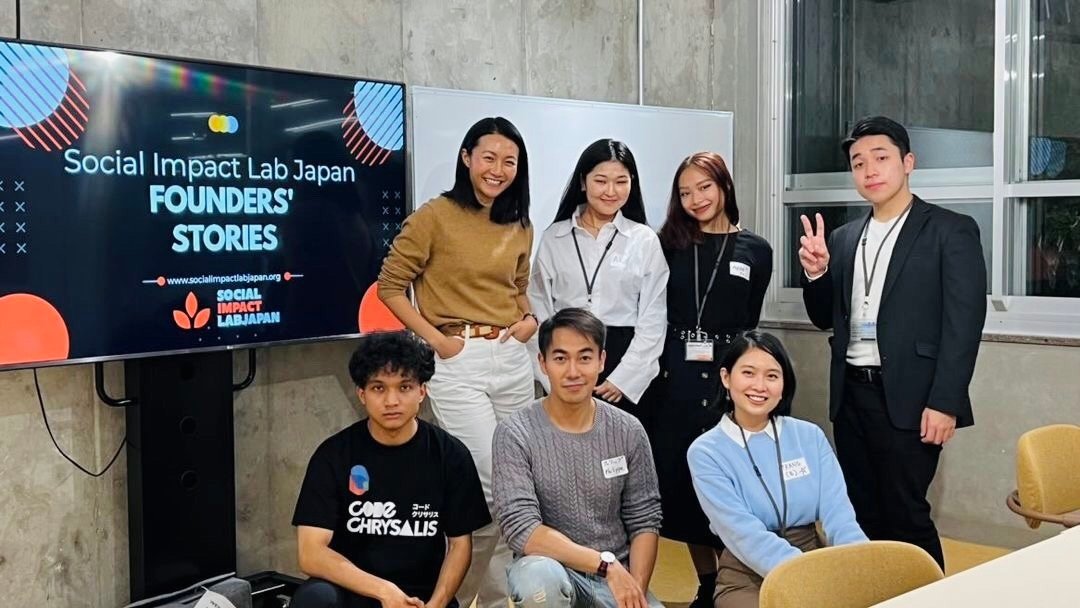

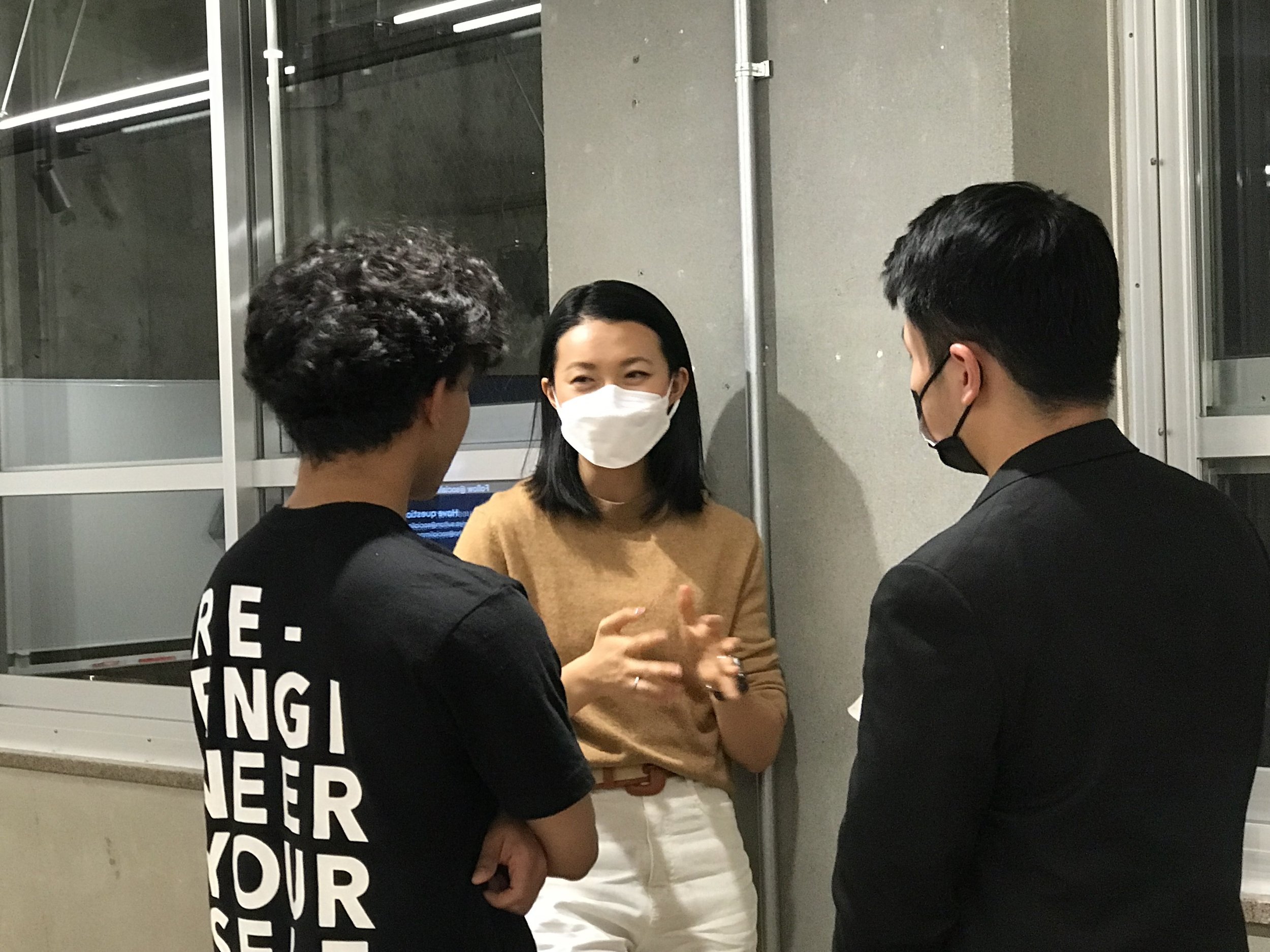

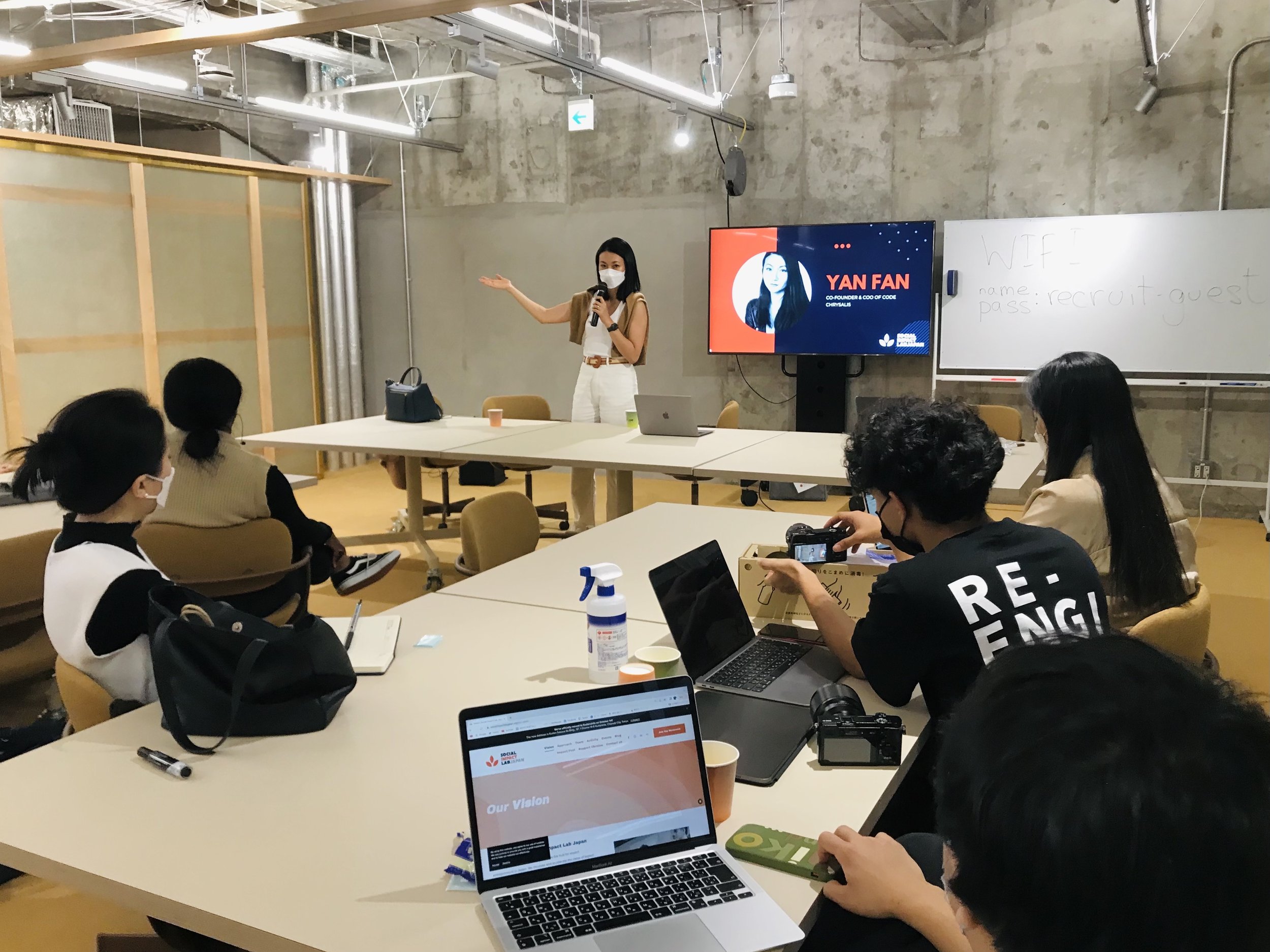

On Thursday, November 17th, 2022, the long-awaited in-person event “Founders’ Impact Stories” was finally held. Facilitated by Social Impact Lab Japan, the event welcomed Ms. Yan Fan, the co-founder and COO of Code Chrysalis, and Mr. Philippe Khin, the CEO of SewaYou to join in and share their personal journey running two of the most recent and innovative startups in Japan. Our goal was to show real-life examples of how business leaders established their enterprises and grow their social impacts in their communities. Under the roles of company leaders, Yan Fan and Philippe Khin delivered speeches describing their own inspirations and how they get to where they are today. This encompasses commitment, determination, and accountability. Our founders come from different backgrounds, however, they shared the same dream - working for something that they share a passion about.
For Yan, our inspiring woman leader, starting her career in finance was a good start after graduating from Dartmouth College, but that was not enough. She always felt that something was missing from her life and she was dissatisfied with her job. After deciding to walk away from her company, during her transitioning period, she took the chance to enhance her coding skill which then helped her to land a new job as a software engineer at Ayasdi, a leading Silicon Valley machine learning startup. With the political and social turmoil that happened due to the 2016 Syrian civil war, she found herself training and co-founding a coding boot camp to help refugees ensure their livelihood. Later on, she met Kani Munidasa, her now business partner, to start a boot camp of their own. This became the well-established Code Chrysalis we know today. Code Chrysalis has helped thousands of people, including many women, to start their careers in coding, and gain access to technical skill training programs across Japan.
After graduating from college, Philippe started building SewaYou as a language exchange app to teach himself how to create different features from scratch. Before the time that SewaYou became his full-time commitment, he worked as a Software Development Engineer for Mitsubishi Electric Power Products, Inc., and then as a Full Stack Engineer for AXA, a multinational insurance company. His quest was to learn things by building, and be familiar with new technologies through app development, user requests handling, email marketing, etc. Like Yan, Philippe embraced his entrepreneurial urge, went on to quit his job, and started working as the CEO of the company. With his motto of “Customer is always right”, SewaYou was developed to fit the market that it was serving, and it has received several positive feedback from users across the platform. In 2022, after 4 years of non-stop side hustling and developing, he successfully secured the VC funding needed for SewaYou to take off to a new level.
Our panelists provided different approaches to starting their own businesses. For Yan, finding the right co-founder, and the right partner was crucial. “It’s kinda like dating to get married, you need to find the right partner”, she added. During the early days of Code Chrysalis, she spent a lot of time talking about vision, hypothetical situations, and scenarios of the business with her co-founder. Rocket Fuel - The One Essential Combination That Will Get You More of What You Want from Your Business by Gino Wickman and Mark C. Winters, was the book that Yan recommended the audience to read. On the other hand, Philippe shared with us the joy of being a solo founder with different hats, assigning and being responsible for different roles in the company while learning all the necessary skills to develop the products. “You can still get help while going solo”, would be the best takeaway that we have from Philippe’s advice. We learned that regardless of having a team or not, the biggest strength founders would have is their proactiveness and determination to get through obstacles and make things happen. Most importantly, as Yan Fan said at the end of the event, "No matter how many books you read and how many preparations you made, you will always make mistakes and you don't learn until you make those mistakes." Our founders agreed on one famous quote: “Don't be afraid to dream big. Shoot for the moon and even if you miss, you'll still land on a star”.
For Code Chrysalis, the biggest social impact that the company generated was giving access to professional training through boot camps, hence promoting a new generation of tech-savvy programmers that are capable of working with codes. For SewaYou, the eradication of language barriers and fostering community building is the clearest measurement, helping more than 4000 people to connect and build meaningful relationships. Throughout the conversation, we were able to not only understand more about our guest speakers’ motivation, but also their strength, resilience, and their strategic decision-making process that brought them the success that they have today. We are incredibly grateful for the opportunities to learn more about the challenges that they faced during their time building the company, and we truly hope that the companies would continue to thrive and provide a much greater social impact to the community at large. Furthermore, we hope this event would inspire the next wave of leaders who will take the action to work on something that they love while making a positive change in other people’s lives the way they want to.
Once again, we would like to send our biggest appreciation to Yan Fan, and Philippe Khin for taking the time to share with us their valuable experiences. We would like to thank our audiences for their attentive participation and their thoughtful questions to our panelists. Additionally, we would like to thank the team and the volunteers of Social Impact Lab Japan to make this event happen. We look forward to seeing everyone soon!
Inspiring Future Impact Founders Through Storytelling
Starting out with the same goal of helping rising social entrepreneurs achieve their desired social impact, Social Impact Lab Japan (SILJ) and Japan Venture Academy collaborate and coordinate the post-pandemic in-person event ‘Storytelling for Impact Founders’.
Starting out with the same goal of helping rising social entrepreneurs achieve their desired social impact, Social Impact Lab Japan (SILJ) and Japan Venture Academy collaborate and coordinate the post-pandemic in-person event ‘Storytelling for Impact Founders’. The event was successfully co-hosted by Ms. Quynh Trang Ho Thi, SILJ Project Manager, and Kento Akiyama, JVA Founder who delivered inspirational speeches going from zero to the leading roles of sustainability in Japan today.
This event focuses on “enabling young generations to take action and think of alternative ways to change the world.” - Kento Akiyama.
Why is Storytelling a crucial skill for impact founders? Everything has its own story. Humans find it easier to connect to one another through similar stories. It is a common case that social entrepreneurs have their own stories which connect them to the social issue being addressed. Their main task as an entrepreneur is to deliver a story that identifies an issue, fosters sympathy, and understanding, and creates the widespread urge to change. The ability to deliver a story equals to the ability to attract fellow changemakers.
Sensing a hint of shyness in the air as people begin adjusting to in-person events, an icebreaker game is organized. The game promotes effective interaction and communication. Individuals have the chance to formulate concise questions that allow them to achieve the desirable answers as soon as possible. This not only stirs up the atmosphere but also acts as an adhesive device for the latter team formation.
JVA Founder attempts to better the understanding of the audience on Storytelling by providing applicable examples from notable storytellers: Martin Luther King and ‘I have a dream alongside the Hero’s Journey Framework. Kento Akiyama settles on using mainly Joseph Campbell’s Hero’s Journey Framework for today’s workshop.
With the task given that asks three teams to choose one out of three provided social businesses and apply the business model into the framework, attendees settle into their sorted teams and begin working on it. All teams clearly assign responsibilities to the presenter, the note-taker, and the researcher. This accelerates the discussion time and allows teams to push for more detailed analysis. Everyone, then, presents their completed task. After the wonderful speeches from all teams, a reflection session takes place.
Participants are not afraid to voice both positive feedback and constructive criticisms. The overwhelming opinion is questioning the framework and the necessity to stick to it. There is no necessity, the Hero’s Journey Framework is there for reference only.
The path to becoming impact founders is never a straight line and is never a perfect circle. The most important thing is to believe in your Storytelling skill and know that it has the power to nurture change on a local to a global scale in whichever way works best for you.
Author: Anh Hong Xuan Nguyen























